Small living room ideas – take inspiration from these 50 stylish yet compact lounges and turn your own into a standout space
This is how to make the most of every inch of a small living room and make it look elevated at the same time

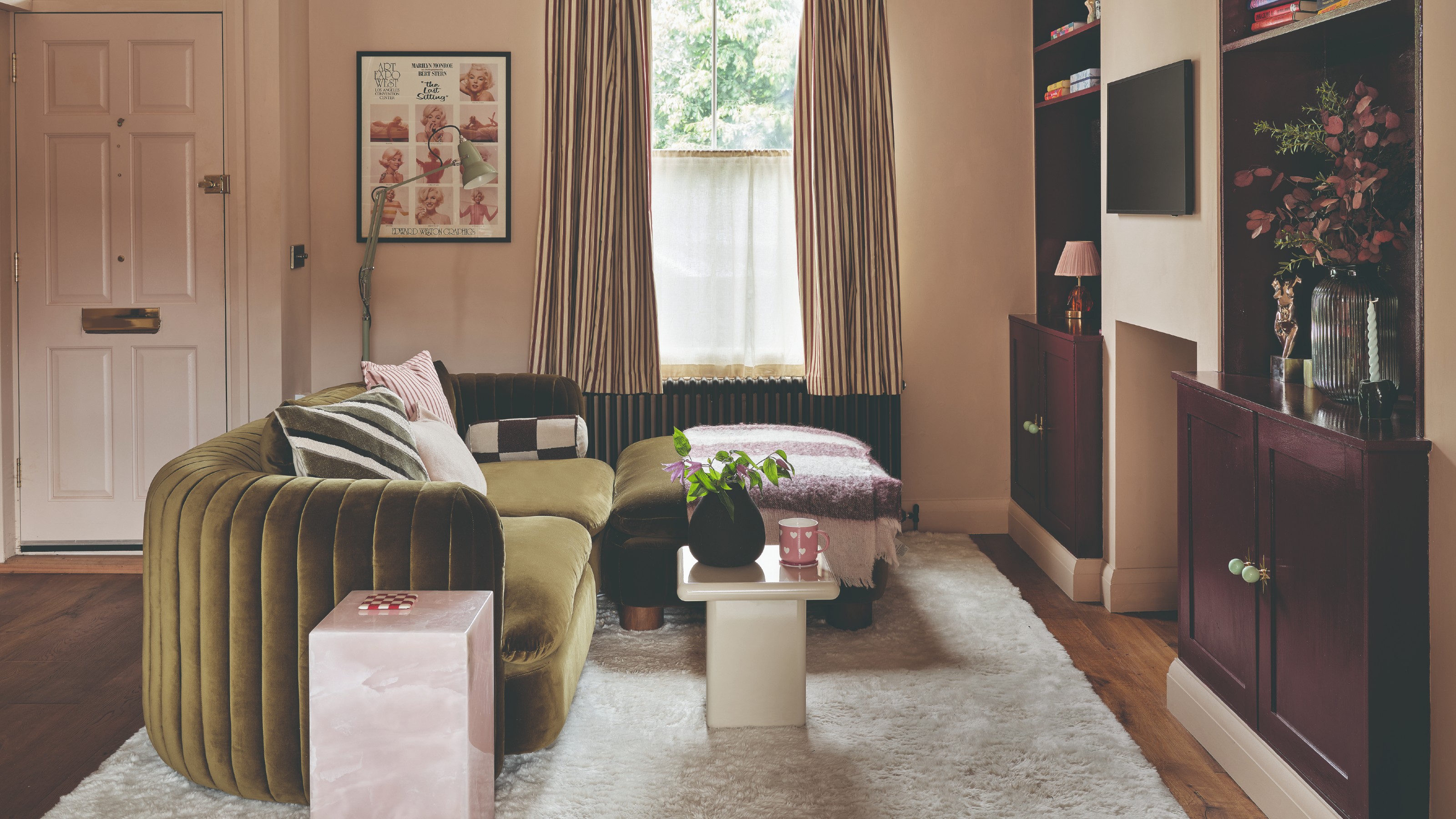
Having a living room that’s on the smaller side is not out of the ordinary in the UK, whether you live in a Victorian terrace house or a new build. Which is why, over the years, Ideal Home has visited a number of homes with compact lounges – and their elevated style and creative, space-saving solutions have provided us with plenty of small living room ideas.
Of course, we would all love to have large, airy living spaces to work with. But often the very challenge of having to work with a smaller space forces us to come up with some extremely clever and creative ideas that we would have otherwise not even thought of.
And just because you’re working with a small living room doesn’t mean you have to sacrifice on style. These spaces and living room ideas which we’ve toured and shot for Ideal Home in the last few years are the perfect examples of this – filled with character style and sometimes even surprising elements that make them even more personable and somehow make so much sense in the respective spaces.
Small living room colour ideas
1. Go for neutrals
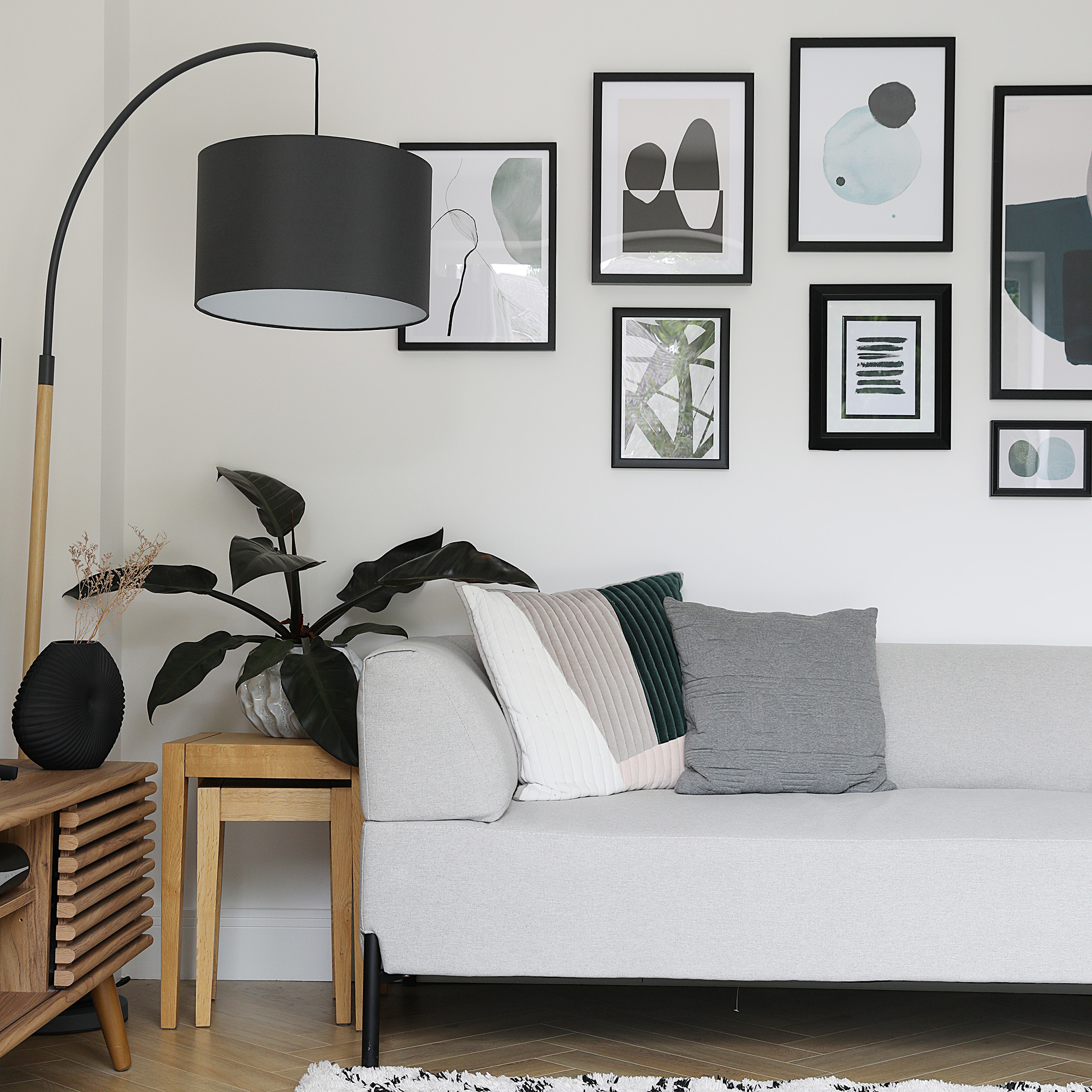
When it comes to choosing the best small living room colour schemes, a palette of light neutrals never disappoints as it’s proven to visually brighten the space and as a result, make the small living room look bigger.
That's exactly what Jaisie and Matt have done in their Scandi-inspired home and living room. 'My style is quite modern with Scandi influences, focusing on monochrome and neutral colour palettes, with accents of green. It keeps things feeling cohesive. I also like to add interest by mixing texture and natural wood tones as well as through artwork, plants and accessories,’ Jaisie says.
2. Stick to a cohesive colour palette
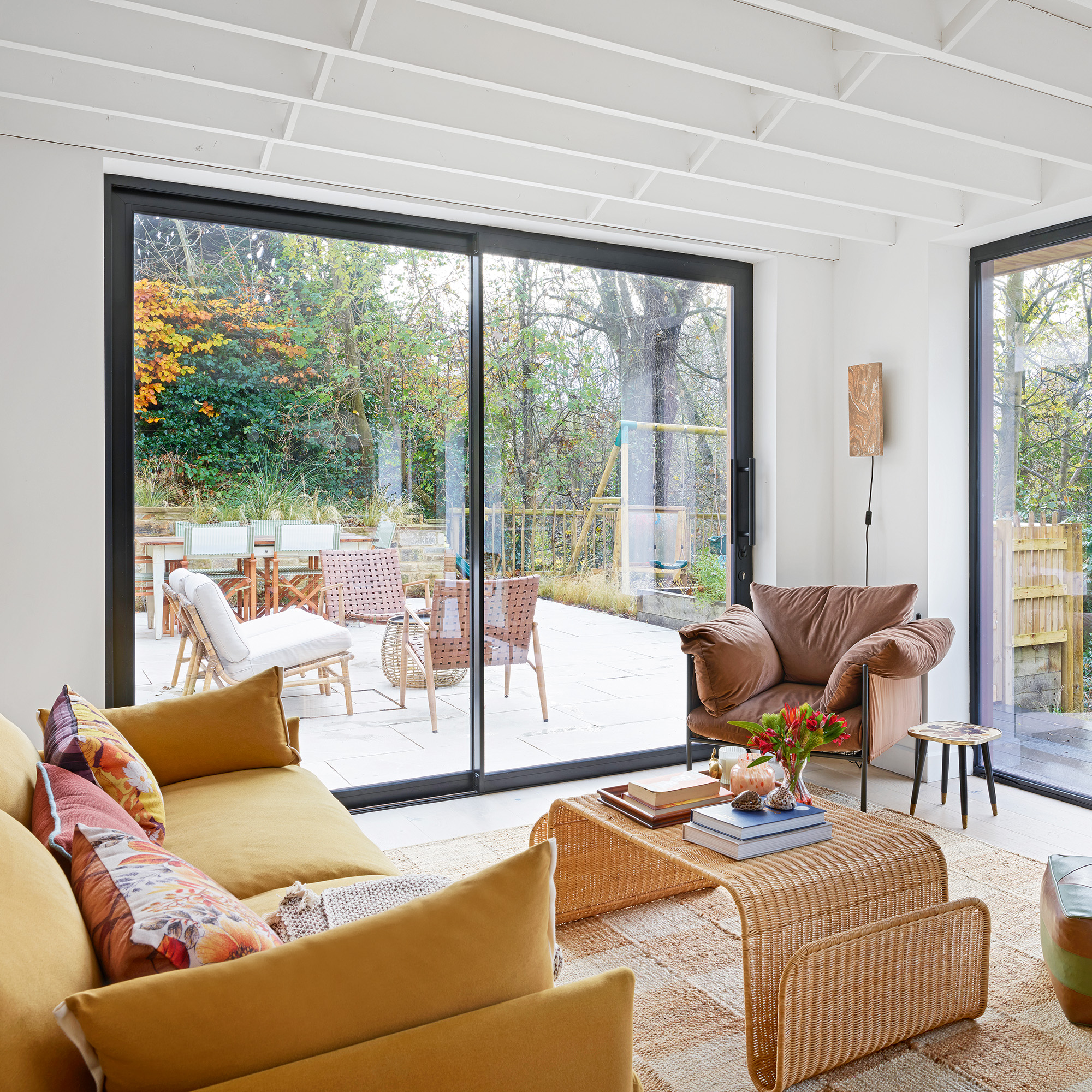
When working with a small living room, it's best to stick to a cohesive colour palette to avoid overwhelming the space. Sticking to two or three key colours will mean everything seamlessly sits together and nothing will jump out too much, making it dominate the room.
And these colours don't have to be boring. Just take Lucy and Andrew's living room in their midcentury modern meets Japandi home. 'There is a colour palette that runs through it, of mustard yellows, muted pinks, greens to reflect the outside and brown, which is very mid-century,’ Lucy says.
Sign up to our newsletter for style inspiration, real homes, project and garden advice and shopping know-how
3. Don't be afraid of colour
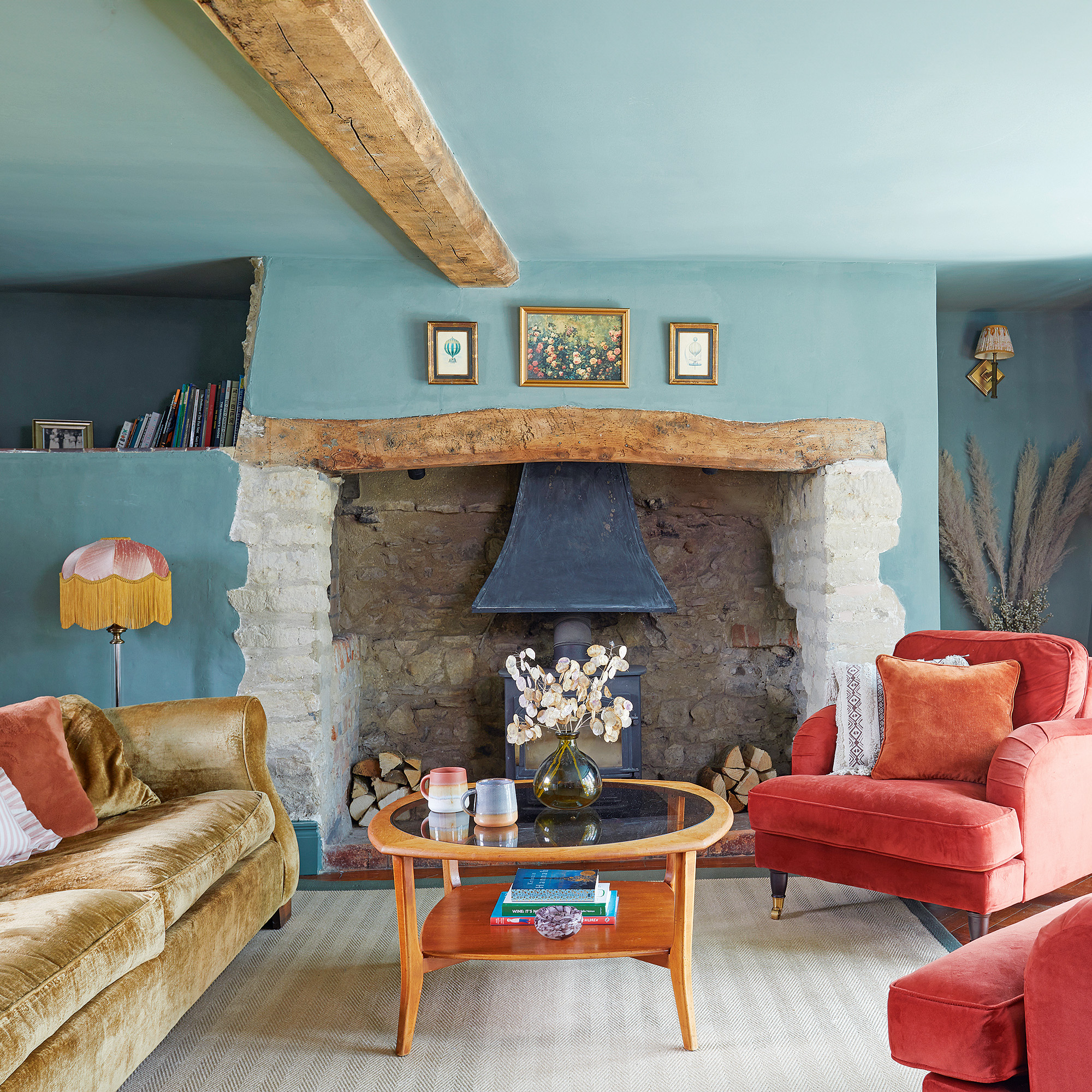
‘First instinct for a small living room is to keep it light, bright and de-cluttered (the word du jour right now) and while this is a perfectly acceptable decorating thing to do, especially if the room is flooded with natural light, sometimes going bolder can also be a wonderful option,’ says Patrick O’Donnell, international brand ambassador at Farrow & Ball.
Kate and Arnold's small living room in their warm and characterful country home is the perfect example, pairing blue colour-drenched walls, ceiling and skirting boards with a gold-hued velvet sofa and a set of vibrant coral armchairs.
4. Go dark
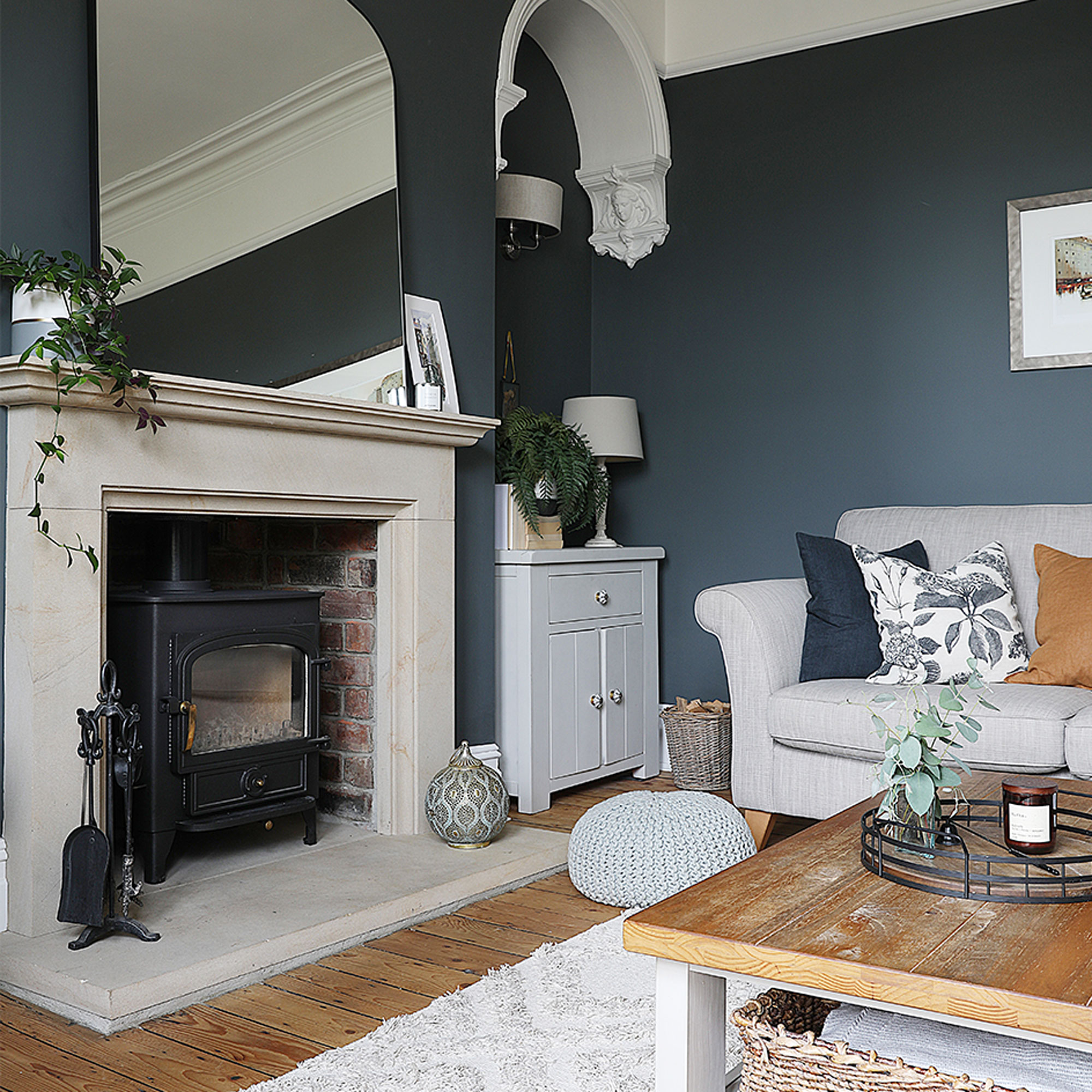
It might feel counterintuitive to go for dark shades in a small living room over light and bright colours, it can make for a lovely cosy living room idea by leaning into the cocooning nature of the space and embracing it.
That's what the owners of this North Yorkshire period property have gone for in their living room with the dark, almost black walls. 'My husband isn’t one for being brave with colours and prefers light, neutral rooms, but I’ve managed to sway him towards dark colours in some rooms. The whole house would probably be a bit darker and moodier if it was just me – but we’ve settled on a good balance and our home is the better for it.’
5. Go for off-white over bright white
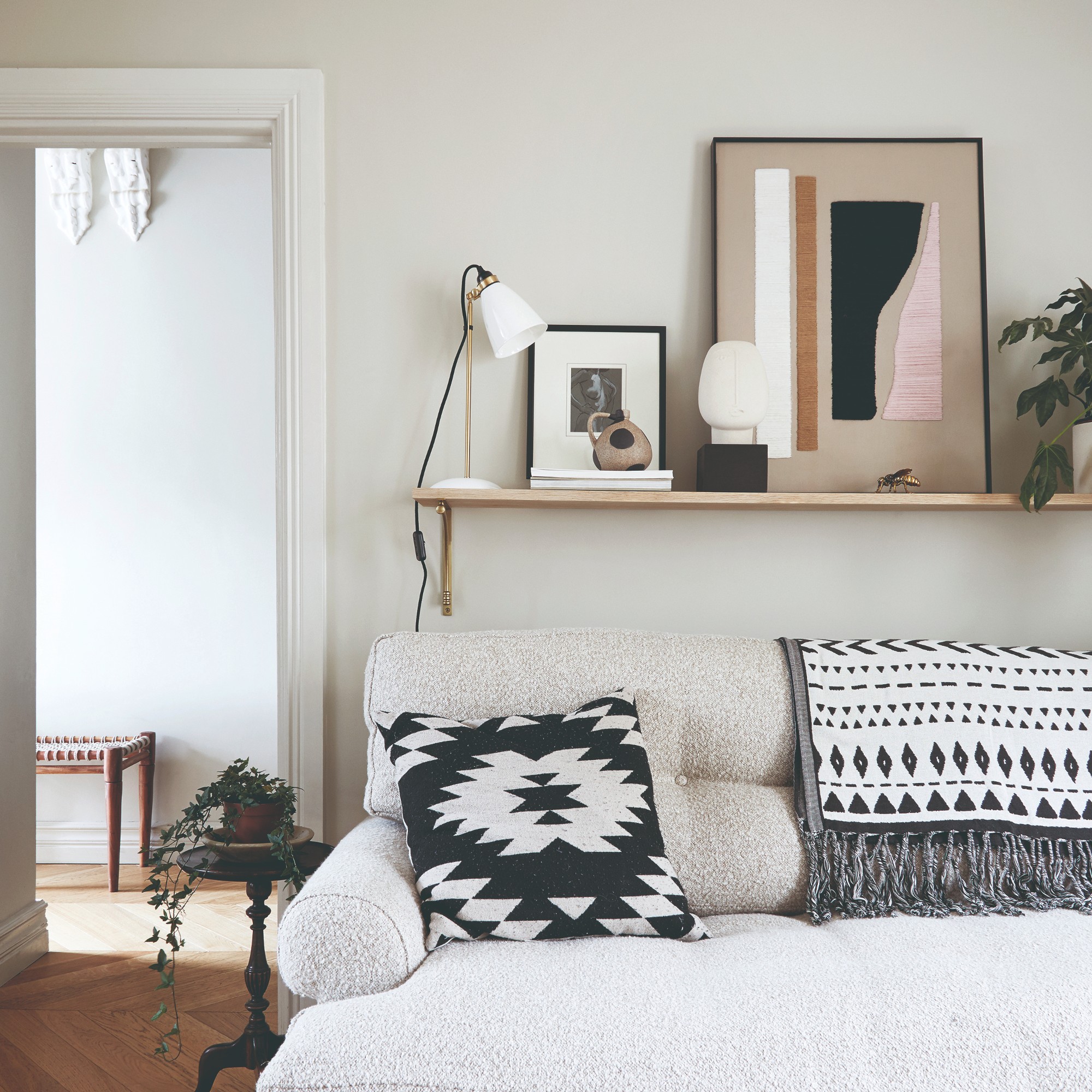
We love a white living room idea. But perhaps surprisingly enough, the cleanest and brightest of white shades should be reserved for larger spaces rather than small living rooms. Small living spaces benefit from warmer off-white shades like Farrow & Ball's Off-white paint colour.
‘Warm off-white often works better in small living rooms with low light as bright white can make the space feel bland and sallow. And it exaggerates shadows,’ says Mandy Rippon, product manager at Frenchic Paint.
6. Have fun with pastels
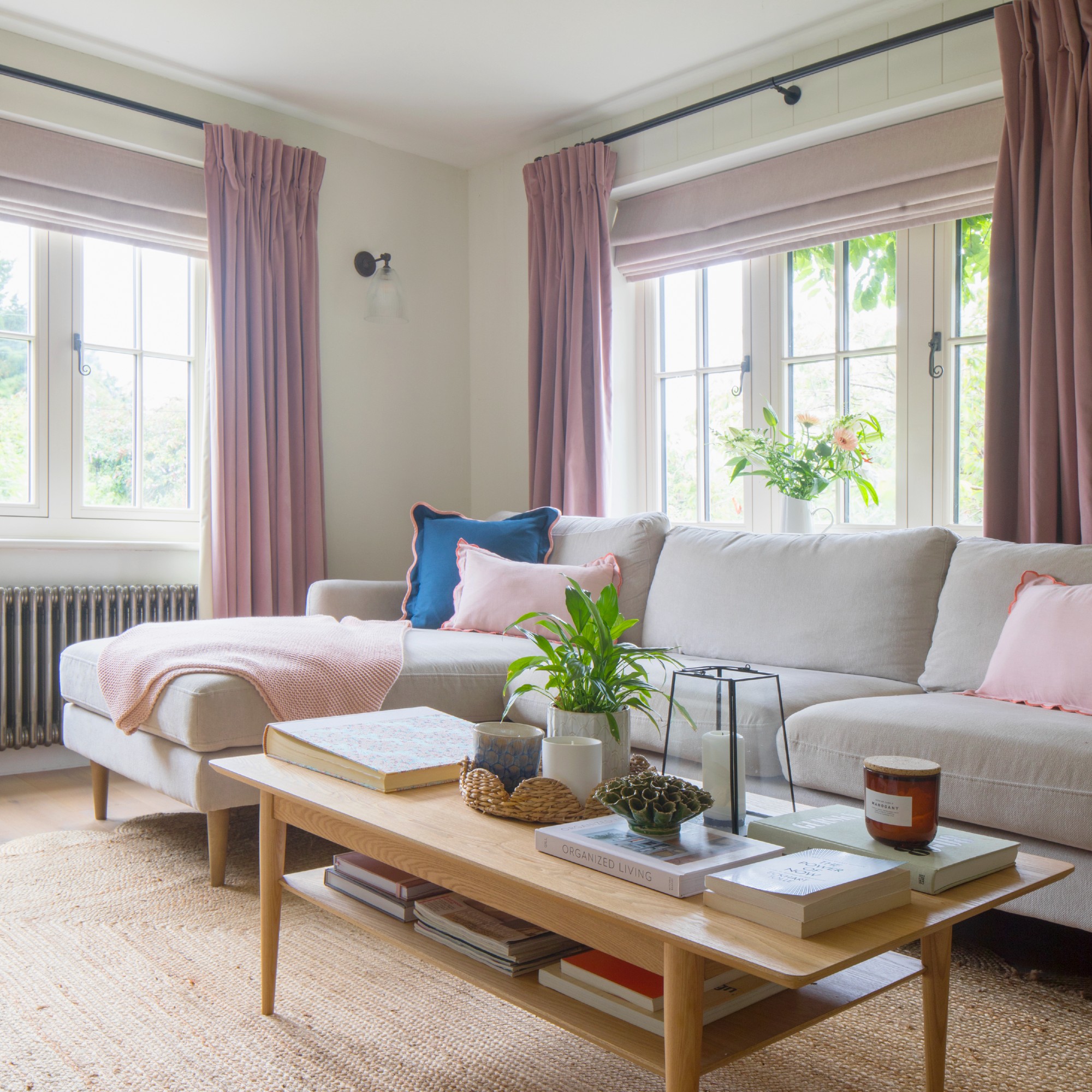
When choosing colours for any living room, it’s important to establish what kind of look and feel one's going for – is it cosy and cocooning or bright and airy that will make the room look bigger? If it’s the latter, pastel shades are the best to incorporate to achieve that look.
This entire house is, in fact, centred around pastels. But the living room picks out soft pinks and blues, both of which are currently among the most popular shades, as are soft greens and butter yellows.
Small living room sofa ideas
7. Choose modular
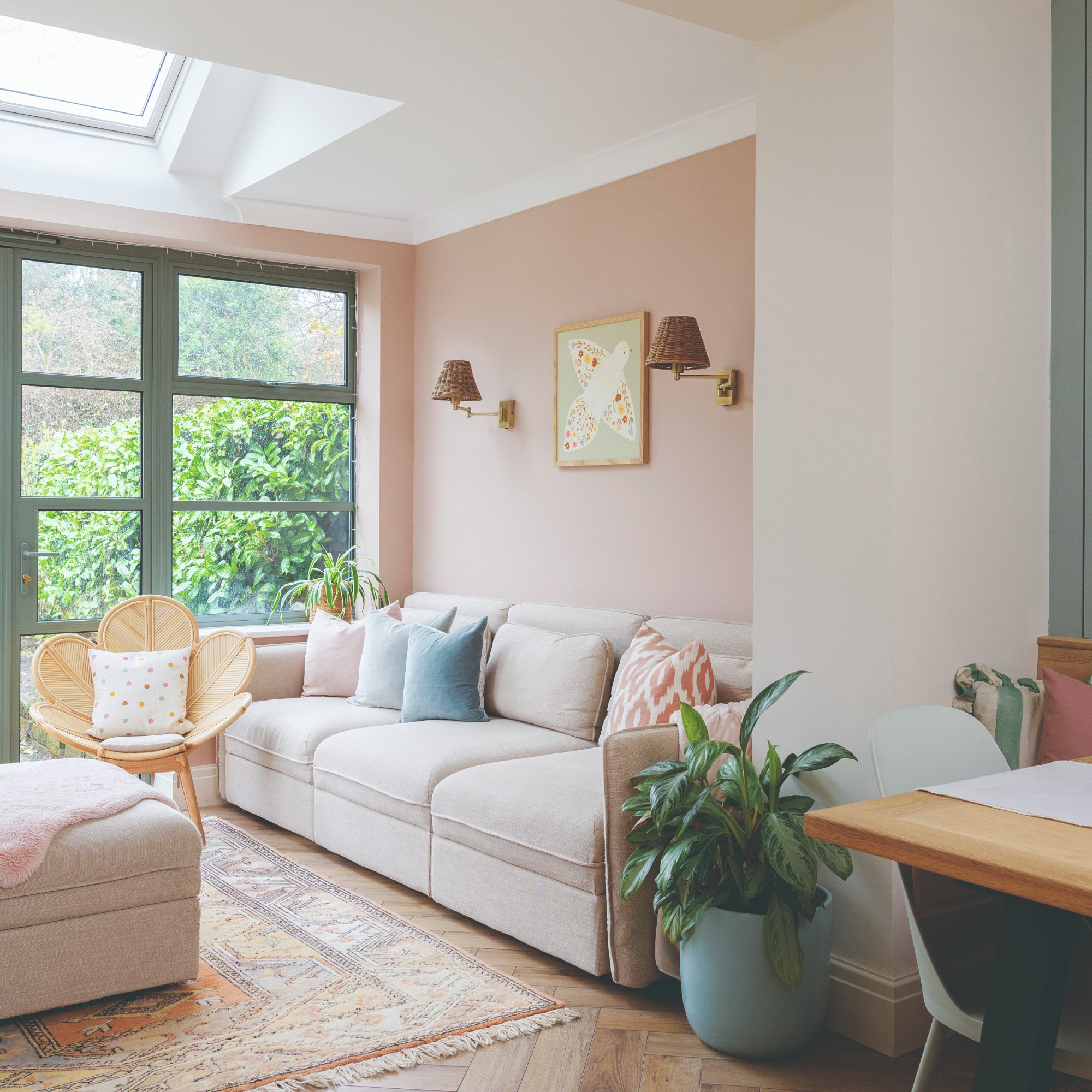
We love a modular sofa here at Ideal Home as they work in pretty much any kind of living room – that’s the beauty of modular sofas like our favourite King Living 1977 sofa, they’re super flexible and versatile. But they work especially well in small living spaces as the modules can be reconfigured to fit any room.
‘Modular sofas can be an excellent choice for small living rooms,’ says Martin Waller, founder of design house Andrew Martin. ‘Their adaptability means you can have them to suit the exact proportions of your space – whether that’s a neat L-shape tucked into a corner or a two-piece arrangement floating in the centre of the room. They offer flexibility without the visual heaviness of a traditional sofa.’
8. Utilise a corner's potential
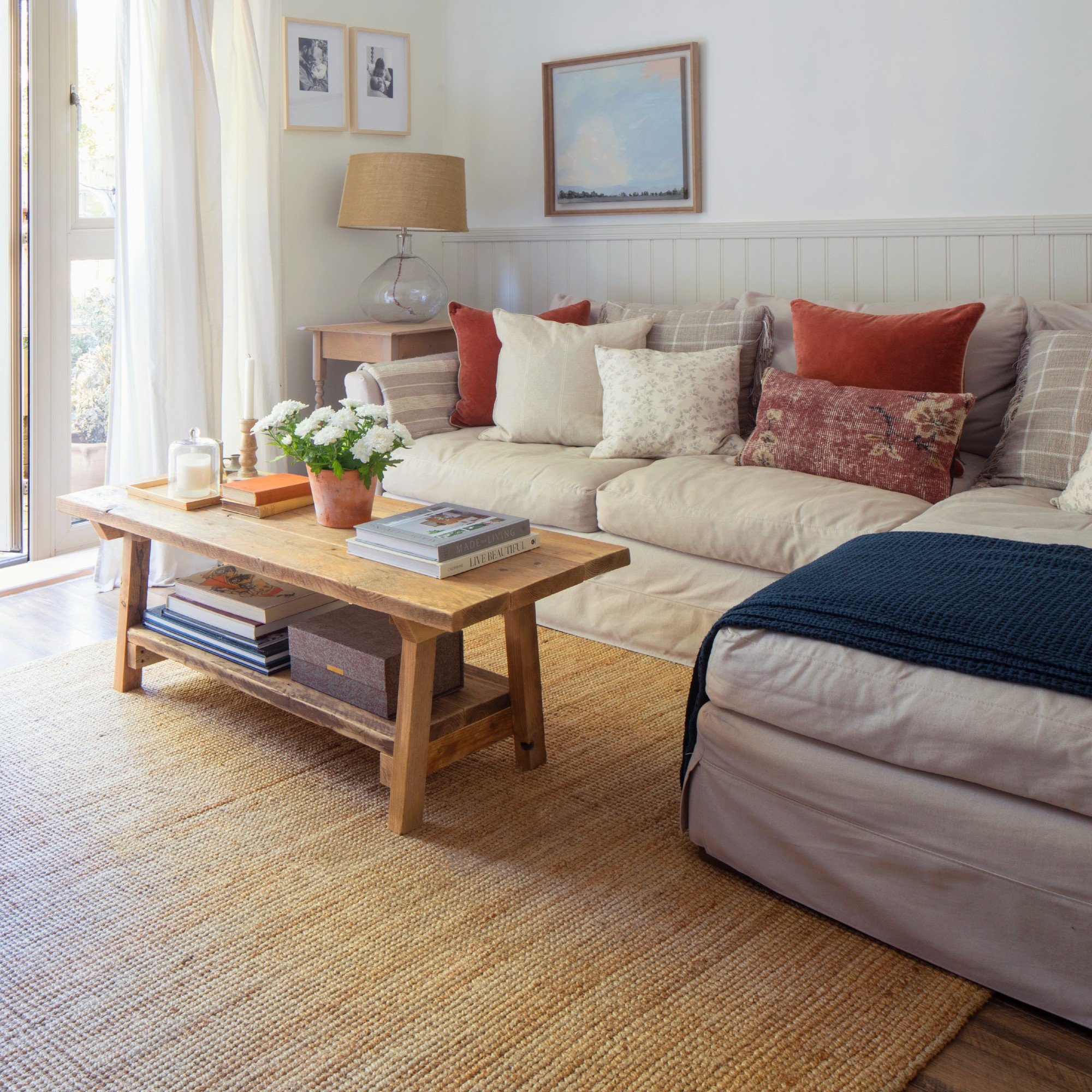
Corner sofas are often thought of as large pieces of furniture, fit only for big living rooms. But the opposite is true. Corner sofas make use of underutilised corner space in a room, wrapping around the edges of the room and providing extra seating at barely any expense of extra space.
The pictured new build not only achieved a country style charm, its compact lounge also managed to make the most of the available space owing to the corner sofa that provides ample seating.
9. Opt for a multifunctional sofa bed

If the living room is small but overnight guests are a regular occurrence, switching out the sofa for one of the best sofa beds might be a smart move. When dealing with a limited space, every piece needs to earn its place there and work twice as hard to stay. Anything that doesn’t need to be there should be on its way out.
And if you want to recreate the look on the image above, invest in the bestselling Habitat Kota sofa bed. Available in several different colourways, this olive green shade is particularly chic.
10. Pick light upholstery colours and fabrics
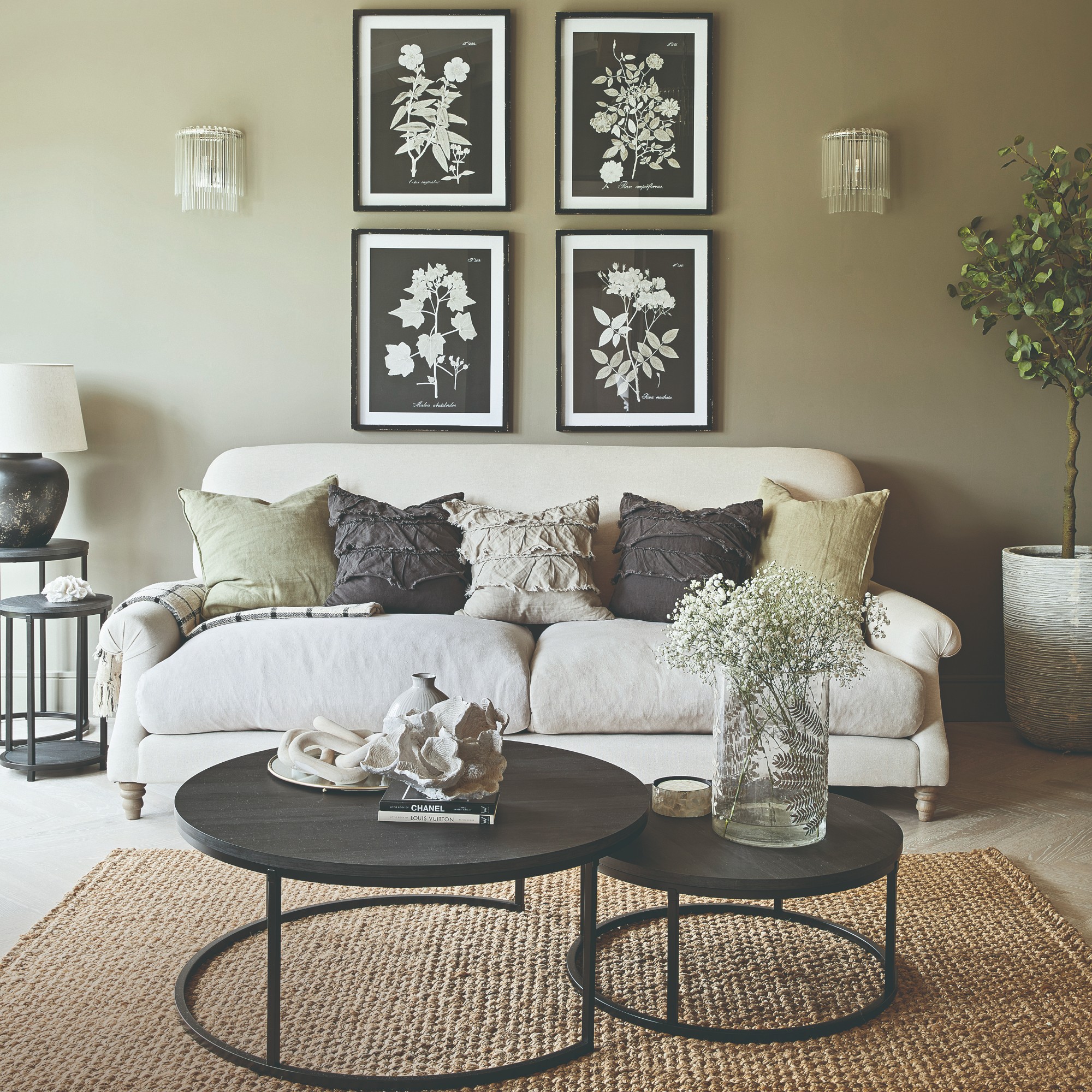
Light neutral upholstery shades are generally considered the best for small living rooms as they have a bright and airy appearance and reflect light. But it's not just about the fabric colours, it's also down the material itself, too. The materials and textures will also impact how the sofa looks and feels in the tight space.
‘Linen and cotton are both light and airy fabrics that provide comfort in smaller spaces and can be easily cleaned. Leather can also work well as it is a sleek fabric and can open up a space – stick to lighter-coloured leather options instead of darker ones to create this look,’ says Lena Gierasinska, head of product and displays at Barker and Stonehouse
11. Avoid bulky designs
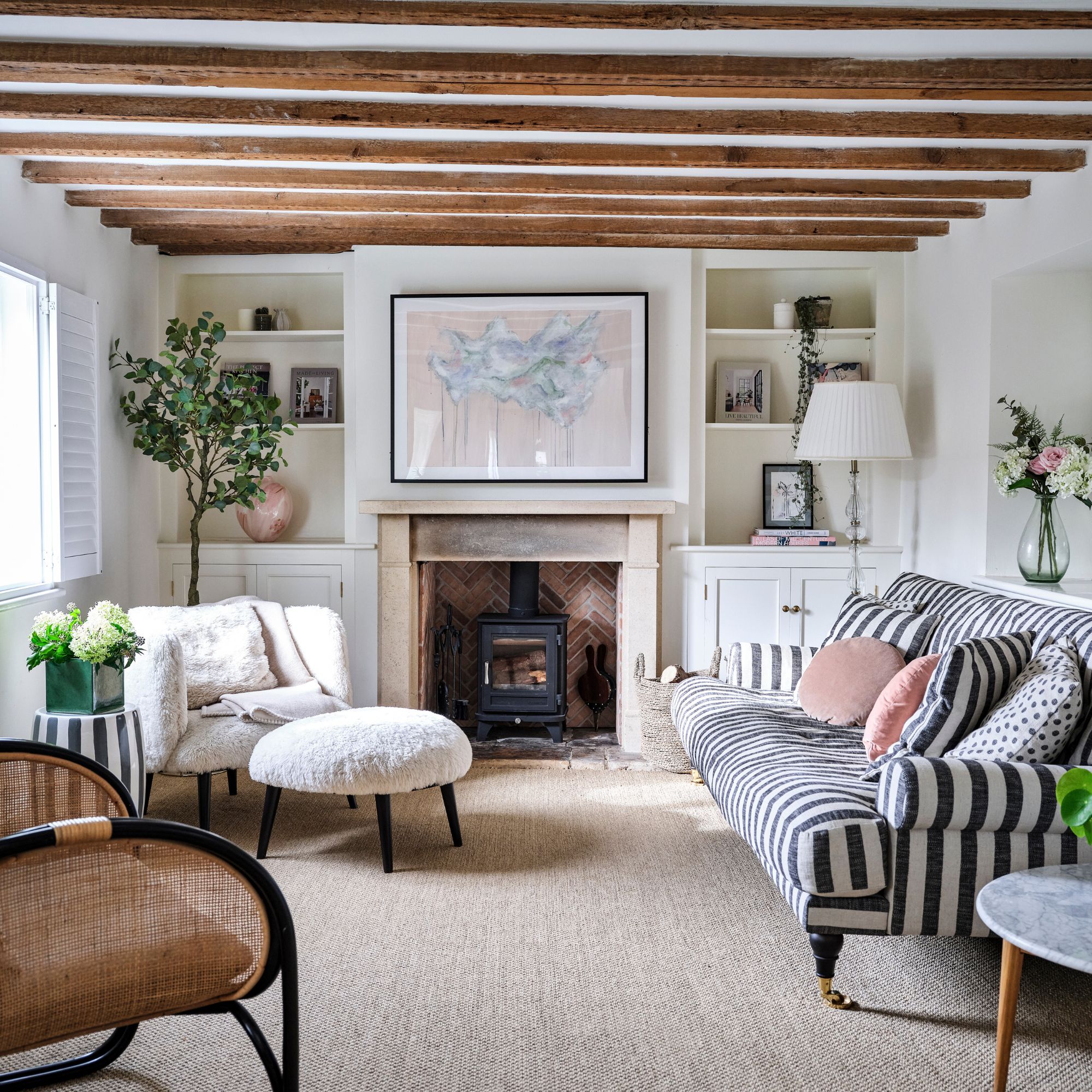
Bulky sofa designs are sure to overwhelm the space and make a small living room look even tinier than it already is. Instead, airy sofa styles with slim or no armrests, legs, straight backrests and seats that are not too deep are the best sofas for a compact lounge.
‘Sofas that are too bulky will leave little room for other furniture and movement in a small room, making it feel more cramped,’ Lena at Barker & Stonehouse warns.
12. Switch sofas for armchairs
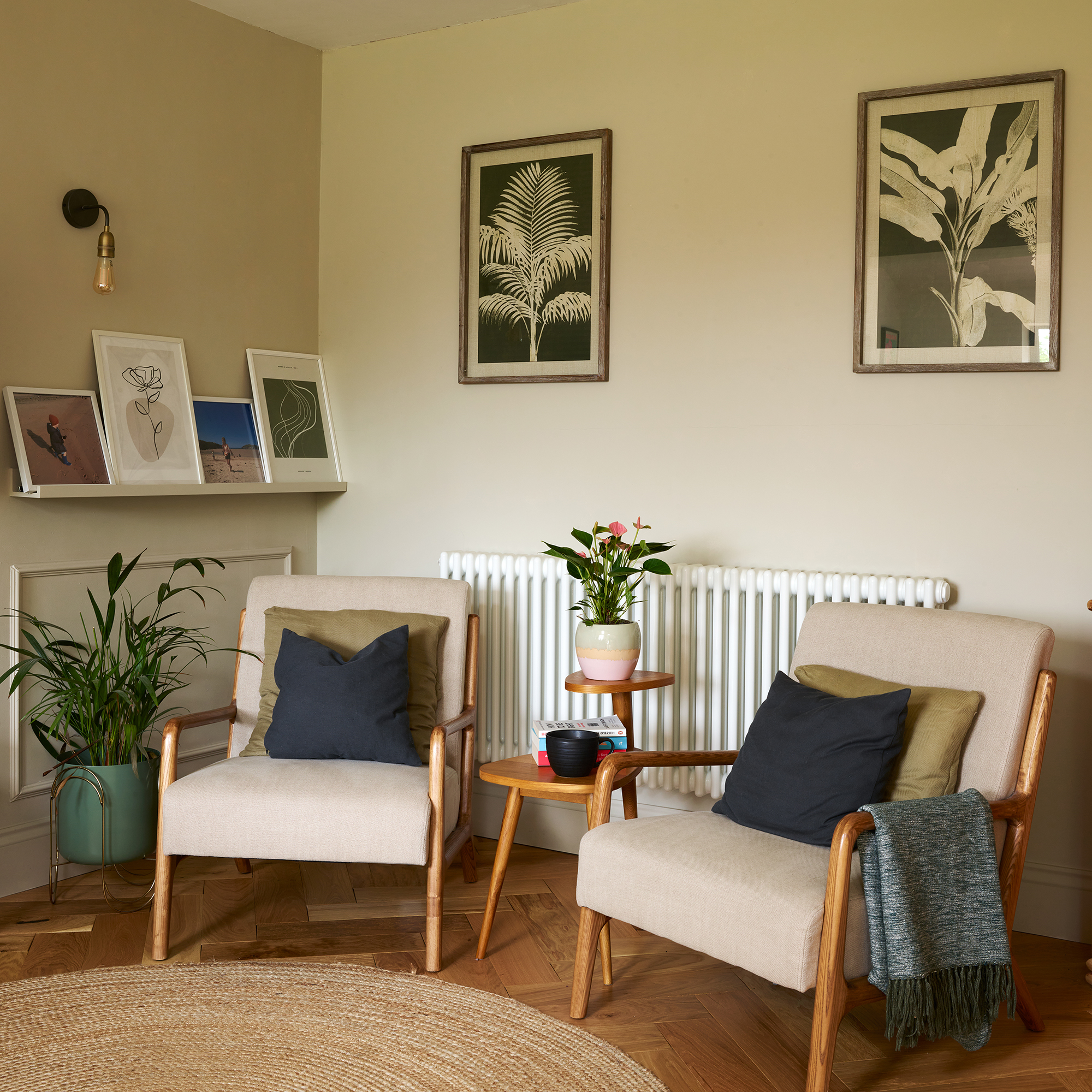
Why struggle to squeeze in one sofa, when you could provide more comfortable seating for a trio with three armchairs? Arranging the living room seating around a chest or coffee table will encourage conversation.
You can have some real fun here, picking the best armchairs in different styles and colours. As long as they all go together, of course.
13. Steer clear of bold patterns
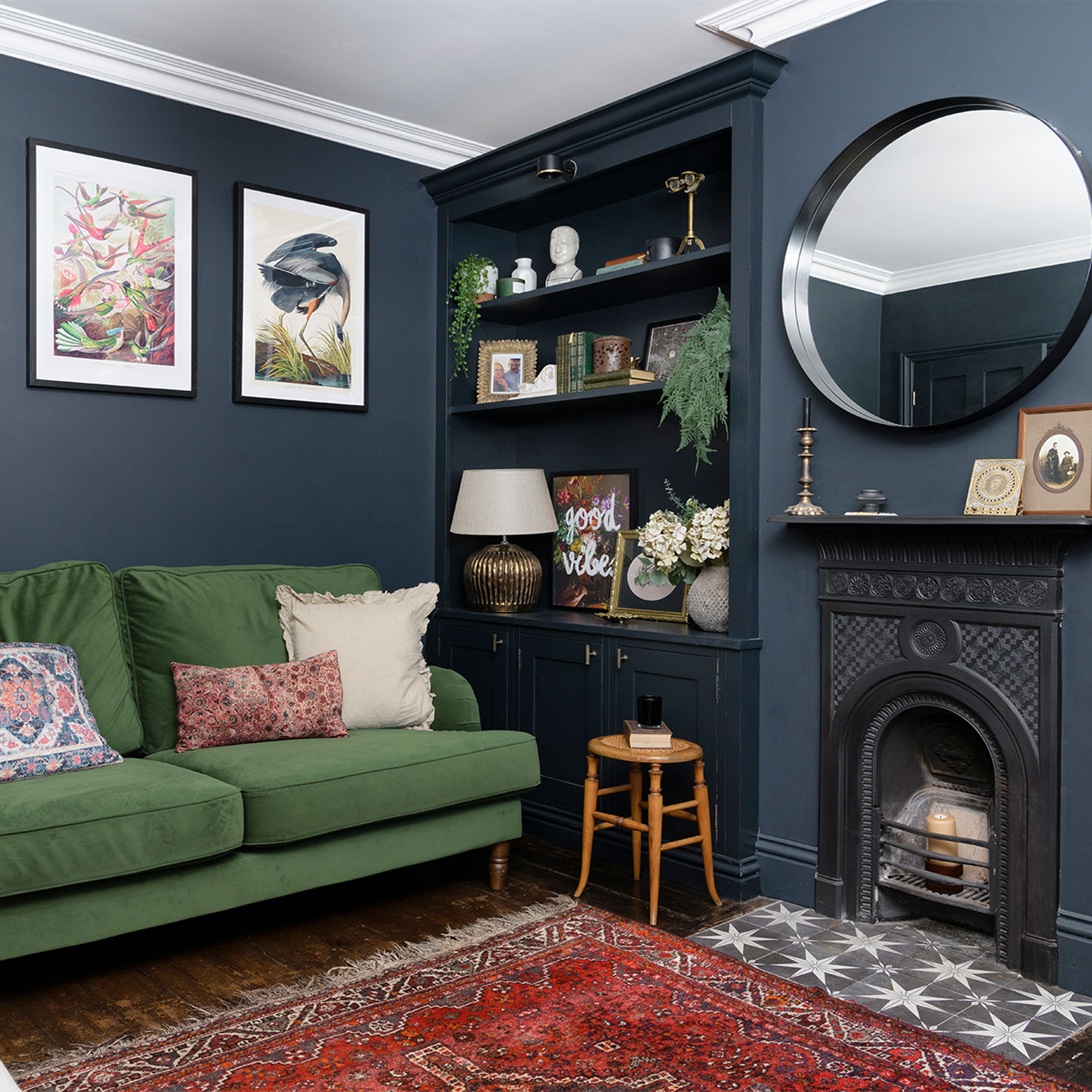
Bold patterns are something best to be avoided on sofas for small living rooms as they can make the space look busy and cluttered – the opposite of what you'd want.
Instead, it's great to focus on bolder shades like the owner of this Edwardian cottage has done in her living room, opting for a contrasting green sofa. 'I originally intended the living room colour scheme to be completely monochrome but colour began sneaking in, starting with the sofa,' the homeowner says.
Small living room paint ideas
14. Embrace colour drenching
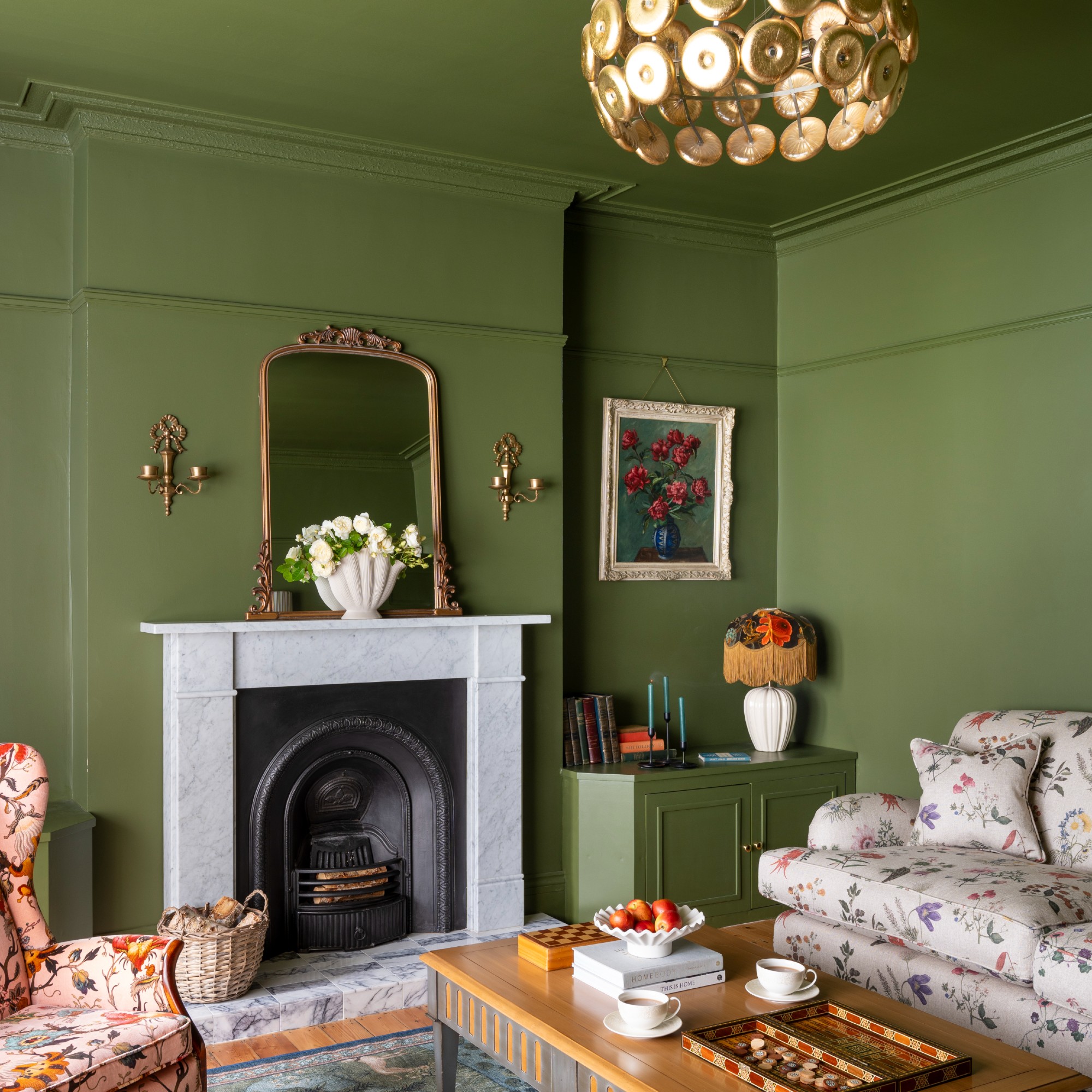
Embracing the colour drenching paint trend of covering all surfaces in the same colour works by distracting the eye from the edges of the room which are usually picked out in another colour.
This paint idea is particularly great for embracing a bold shade in a small space as Derya Berber has done in her Edwardian semi-detached house, colour drenching her living room in a deep green. '‘I’ll always decorate at least one room in a dark moody colour and in my opinion, you can colour drench any space. Think about the impact that colour will have and make sure it gives the room the feeling you want. I fell for this green straightaway,’ Derya says.
15. Do something unexpected
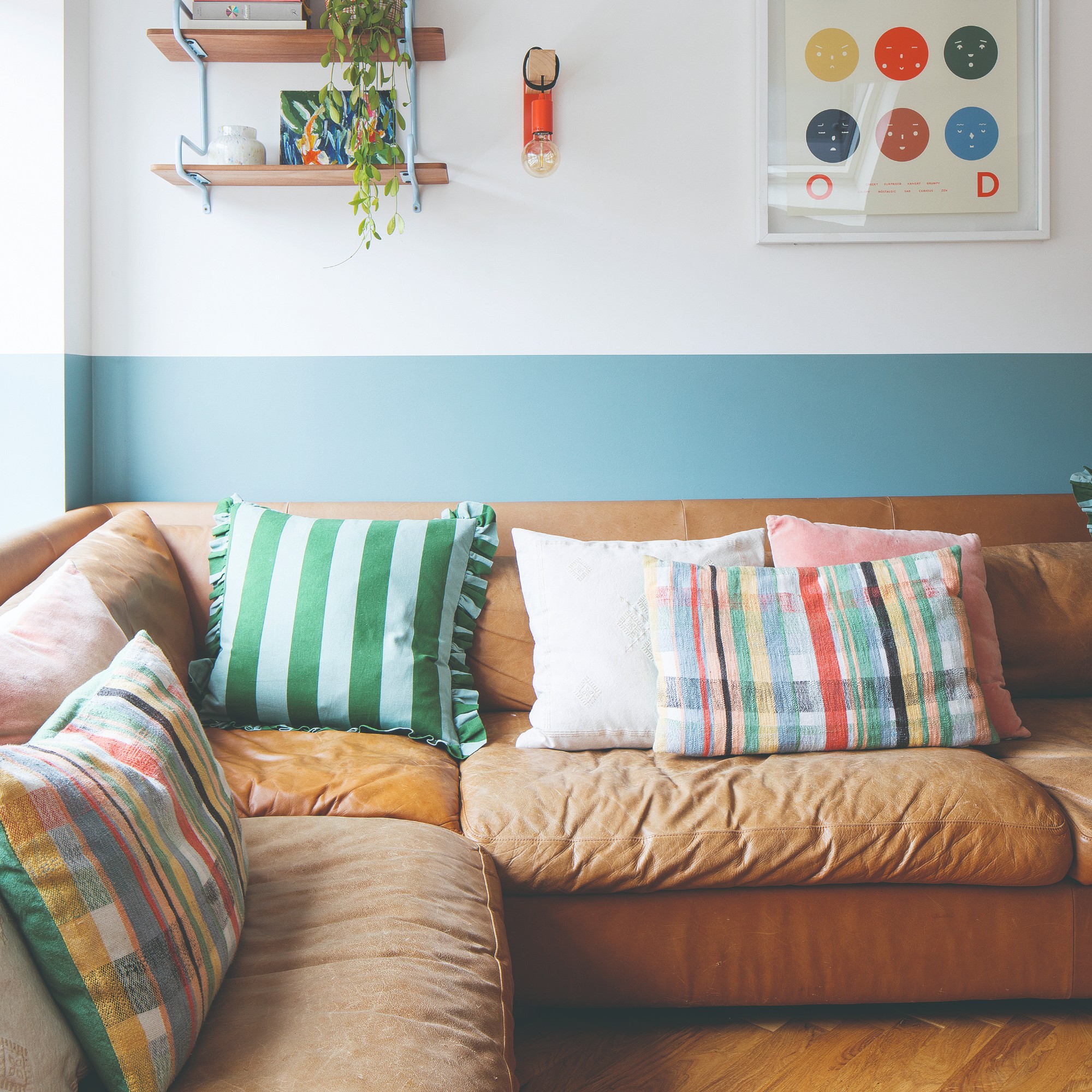
Just because a living room is small doesn’t mean it needs to be boring. On the contrary, the best way to elevate a small space like that is by adding a surprising and cool element.
In the case of this East Sussex family home defined by vibrant colours, owners and Jess and Oliver elevated the walls of this sitting room by a two-tone paint effect with half of the wall painted blue and the other half white.
16. Use two tones of the same colour
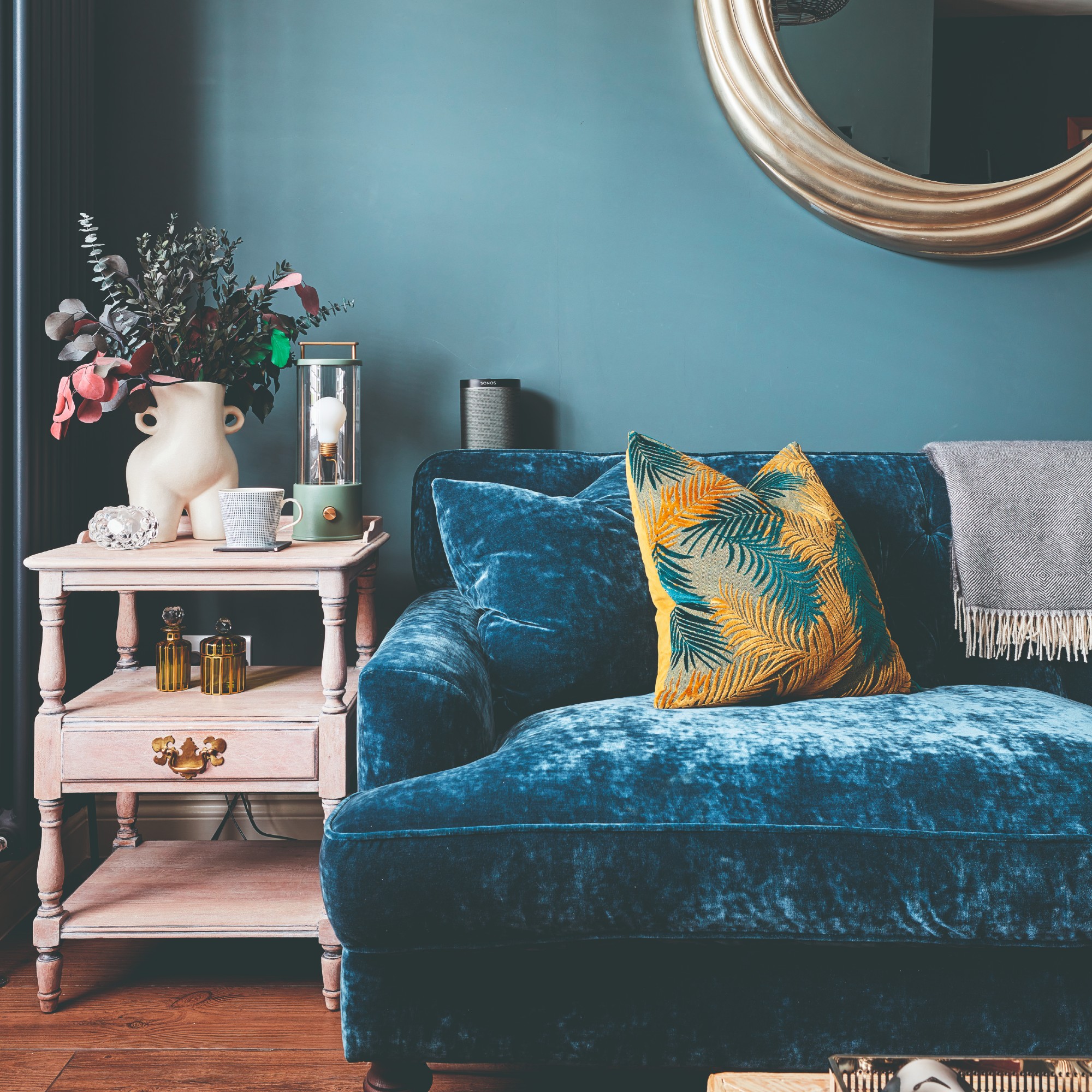
Also known as double drenching - the slightly more evolved form of colour drenching - using two tones of the same colour creates depth in a room which is perfect for a small space like a tiny living room.
‘The more recent trend, double drenching, takes a step further by enveloping the entire room in colour, but instead of using just one shade, two or more related colours are applied to all surfaces,' says Ruth Mottershead, creative director at Little Greene. 'This subtle blending of related colours adds depth and dimension to the room, creating a cocooning, welcoming atmosphere.’
17. Embrace vertical stripes
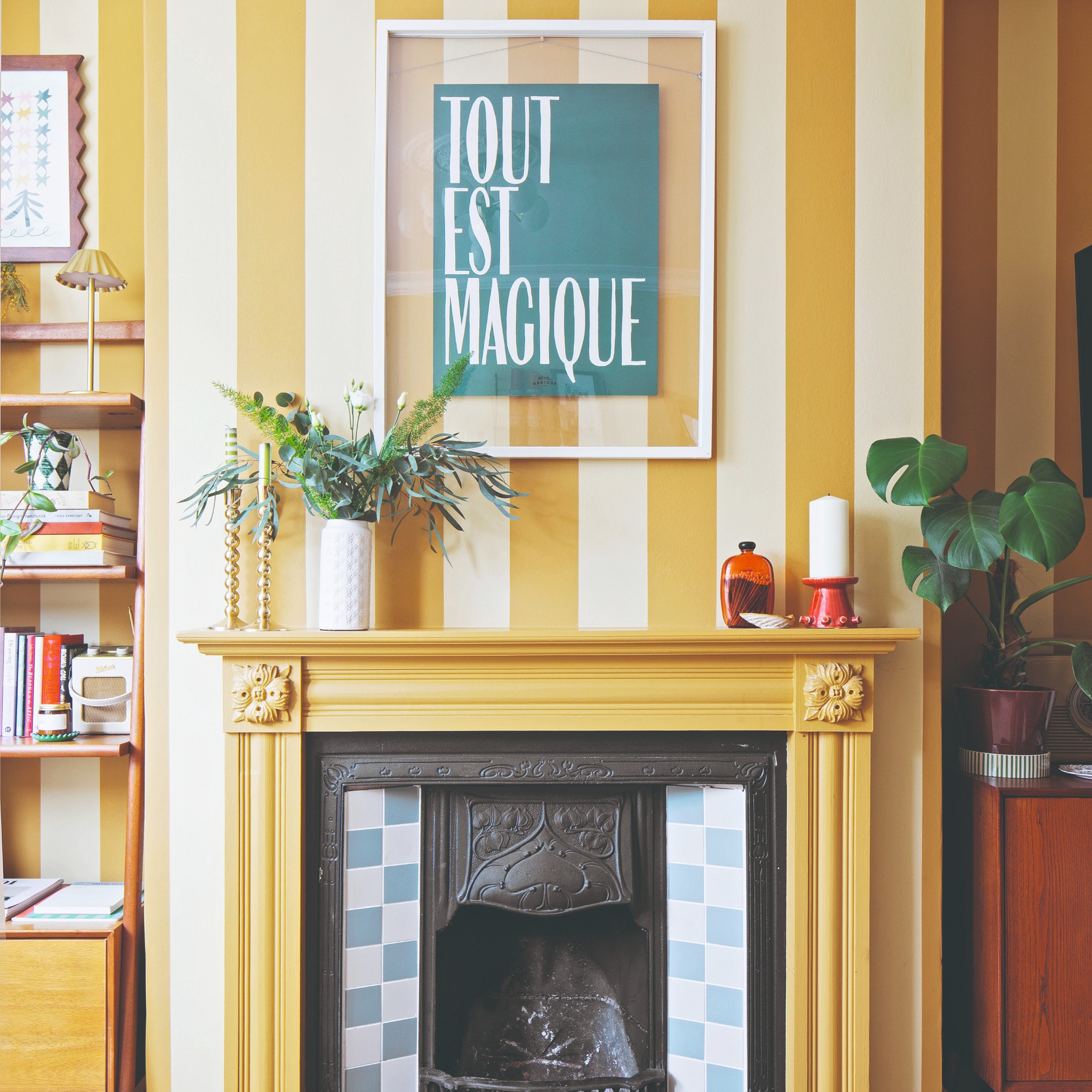
Vertical stripes can make a space feel airier with taller ceilings than they actually are. Stripes are easy to add to walls either in the form of wallpaper or you can paint stripes on your wall.
That's what Jess and Oliver have done in their living room. 'We had a decorator coming to paint the room, and in a rush, I picked the pale yellow colour without testing it first. When it was finished, it didn’t feel right at all. I tend to gravitate towards neutral shades with bold pops of colour, so I came up with the idea of adding the darker yellow stripes to make it more interesting and save us from having to redecorate the whole room,' Jess says.
18. Define space with paint
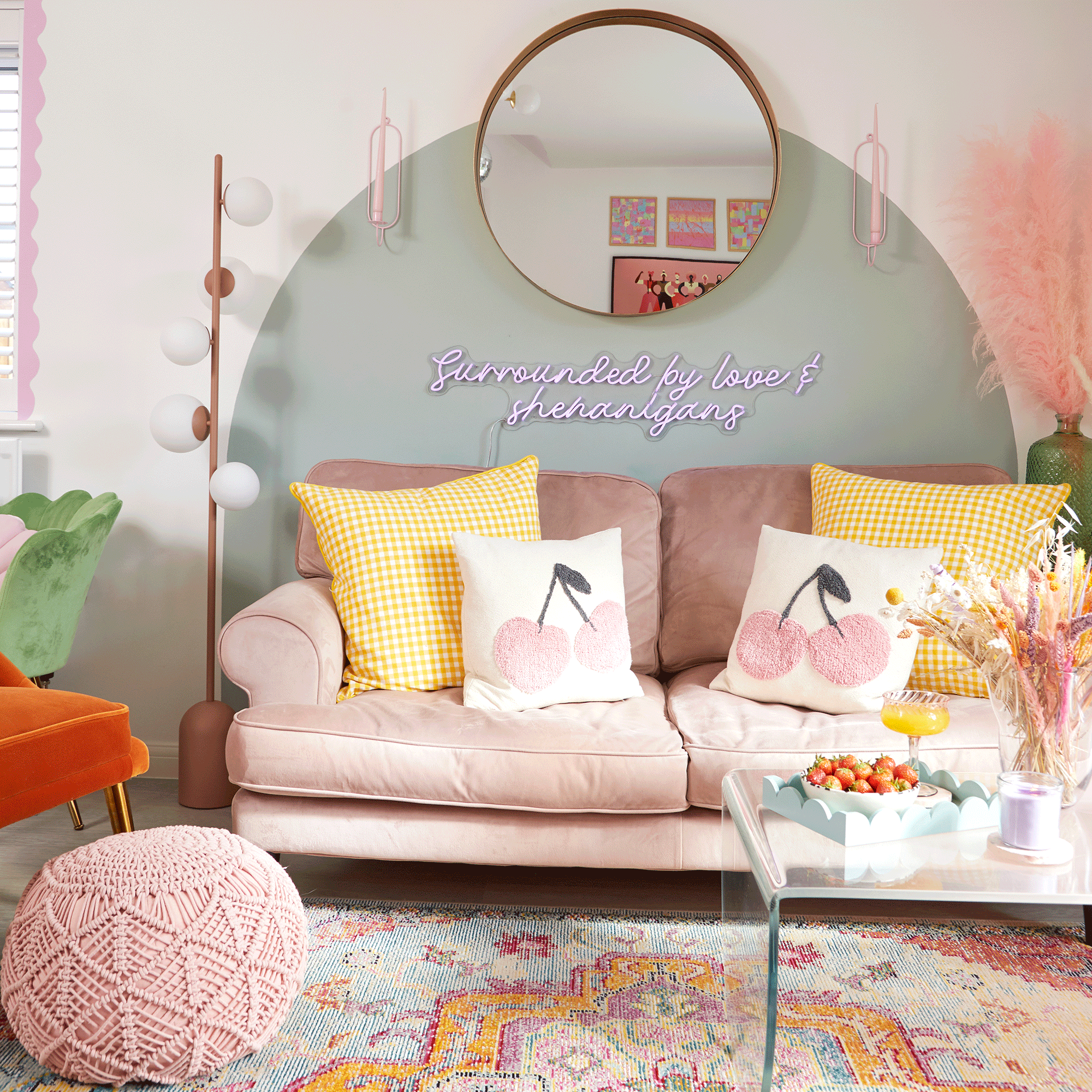
Much like in a larger space, even small living room ideas can benefit from the power of zoning a room with colour through the medium of paint. Whether it's an open-plan space or it has to fulfill more than one function - watching TV, dining, working from home, a reading nook etc. - this trick will not only visually define the space, it will also make it look more interesting.
19. Experiment with the ceiling
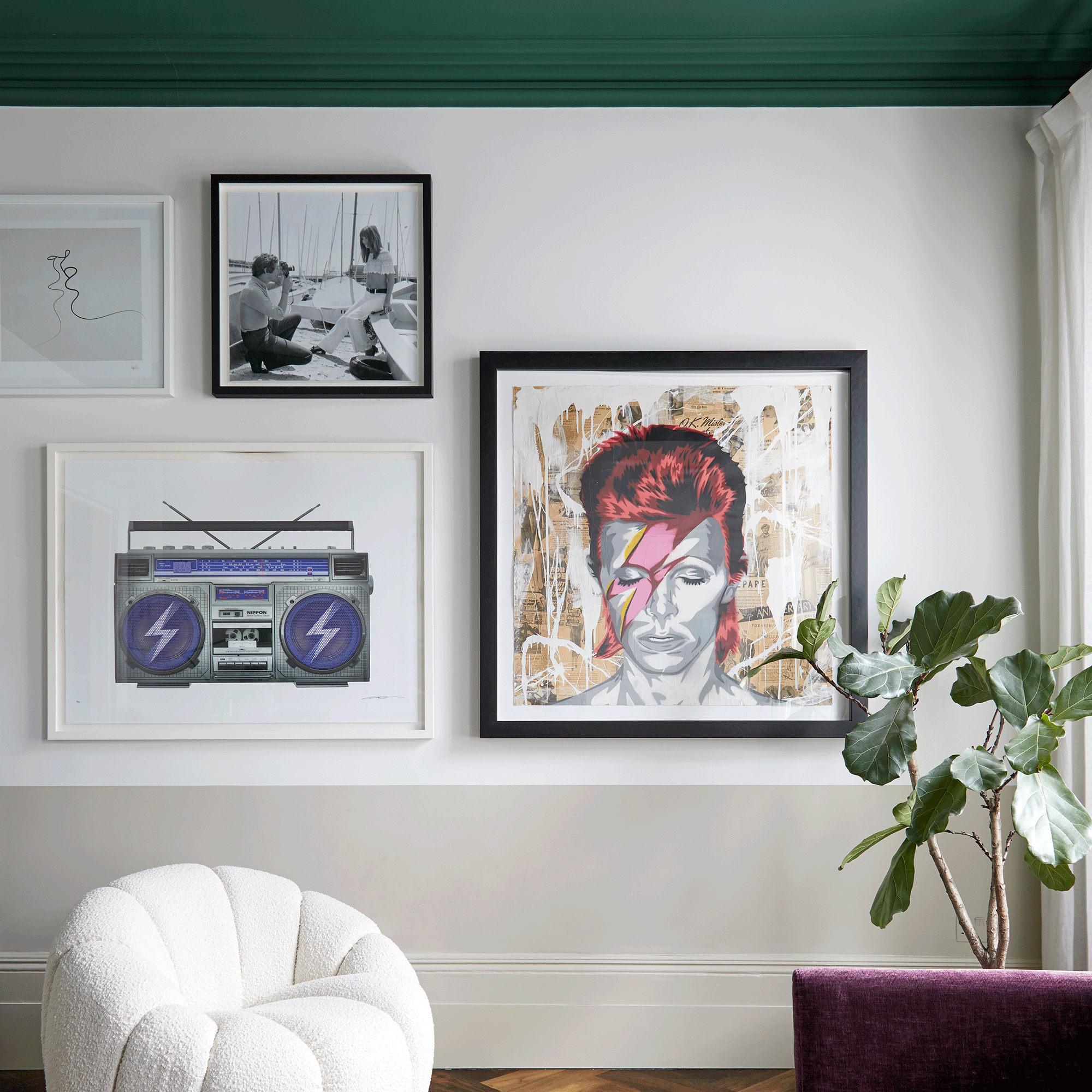
Focusing on the ceiling, also knows as the fifth wall, is currently a big home decor trend. And making a feature of it with paint is one of the easiest ways to highlight it.
'By painting your ceilings in a light blue or light green, such as Lick’s Green 13 or Blue 02 the room will appear taller,' says Lick’s director of interior design and colour psychologist, Tash Bradley.
20. Paint the skirting boards

Breaking with convention, the trick to make a space feel bigger is to paint the skirting boards in the same colour as the wall. No more bold white borders. 'One little tip, paint the skirting boards,' advises interior designer Kelly Hoppen.
'It will make the whole wall look a lot taller. When you paint them white it's a bit like wearing a sock and your trouser leg being too high. It kind of looks a bit odd!'
So even if a colour drenching scheme is too much, at least matching the walls to the skirting boards will make a world of difference.
Small living room TV ideas
21. Turn your TV into art
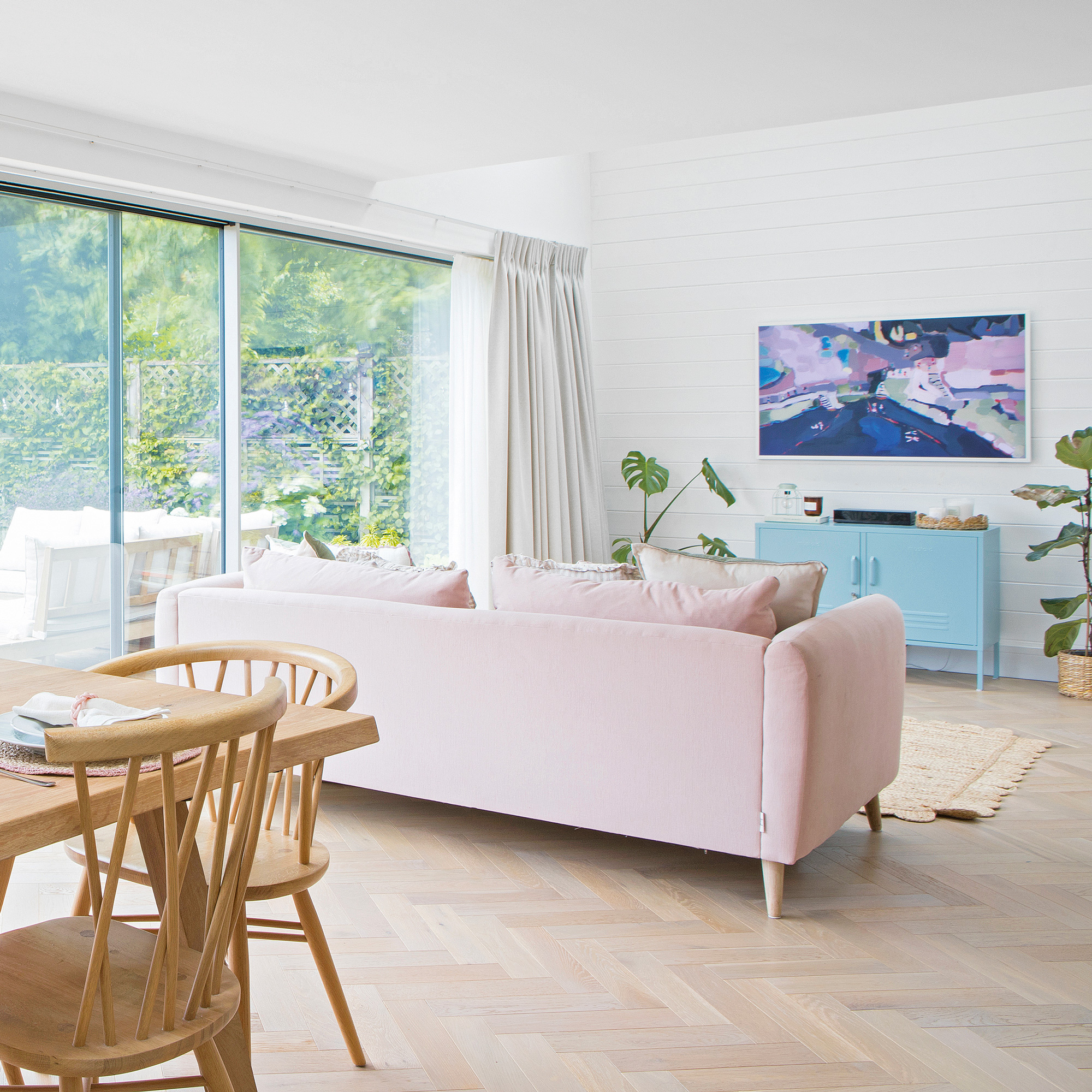
One of the most aesthetically pleasing ways to make sure the TV won’t take over a small living room is by disguising it as wall art. But for that, you need to invest in an art-displaying TV like The Frame TV from Samsung, available at Amazon.
The Frame TV adorns the wall of this living room in a coastal Dorset family home, displaying art that complements the pastel colour palette of the room.
22. Conceal your wall-mounted TV
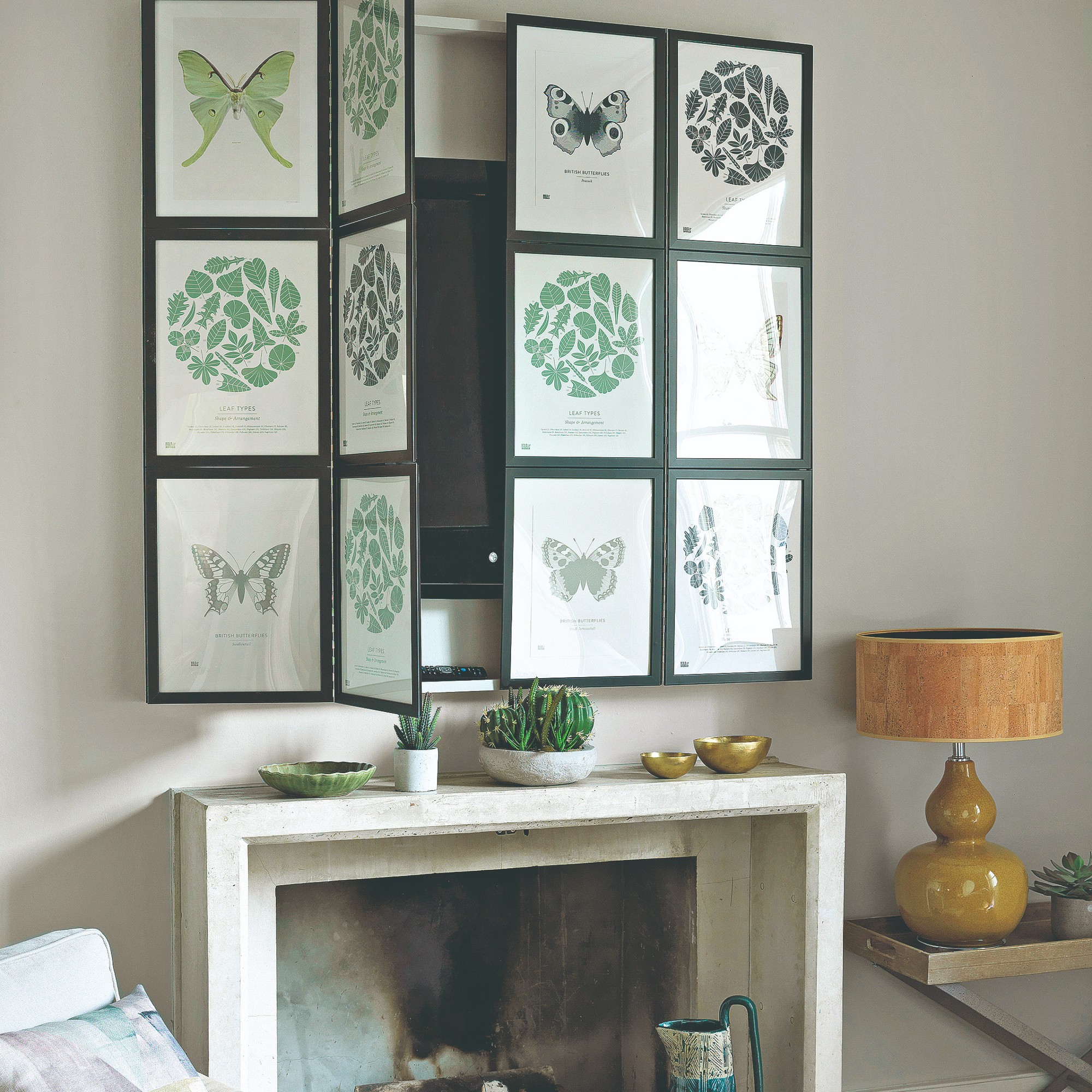
A wall-mounted TV is always going to be the better option for small living room ideas. Nobody wants it taking up valuable space! And since a TV is not necessarily the nicest thing to look at at all times, why not conceal it while it’s not in use?
One way to hide a TV is by covering it with a painting or an artwork, much like TV presenter Laura Jackson has done recently. And we’re obsessed with this solution.
23. Build TV storage along one wall
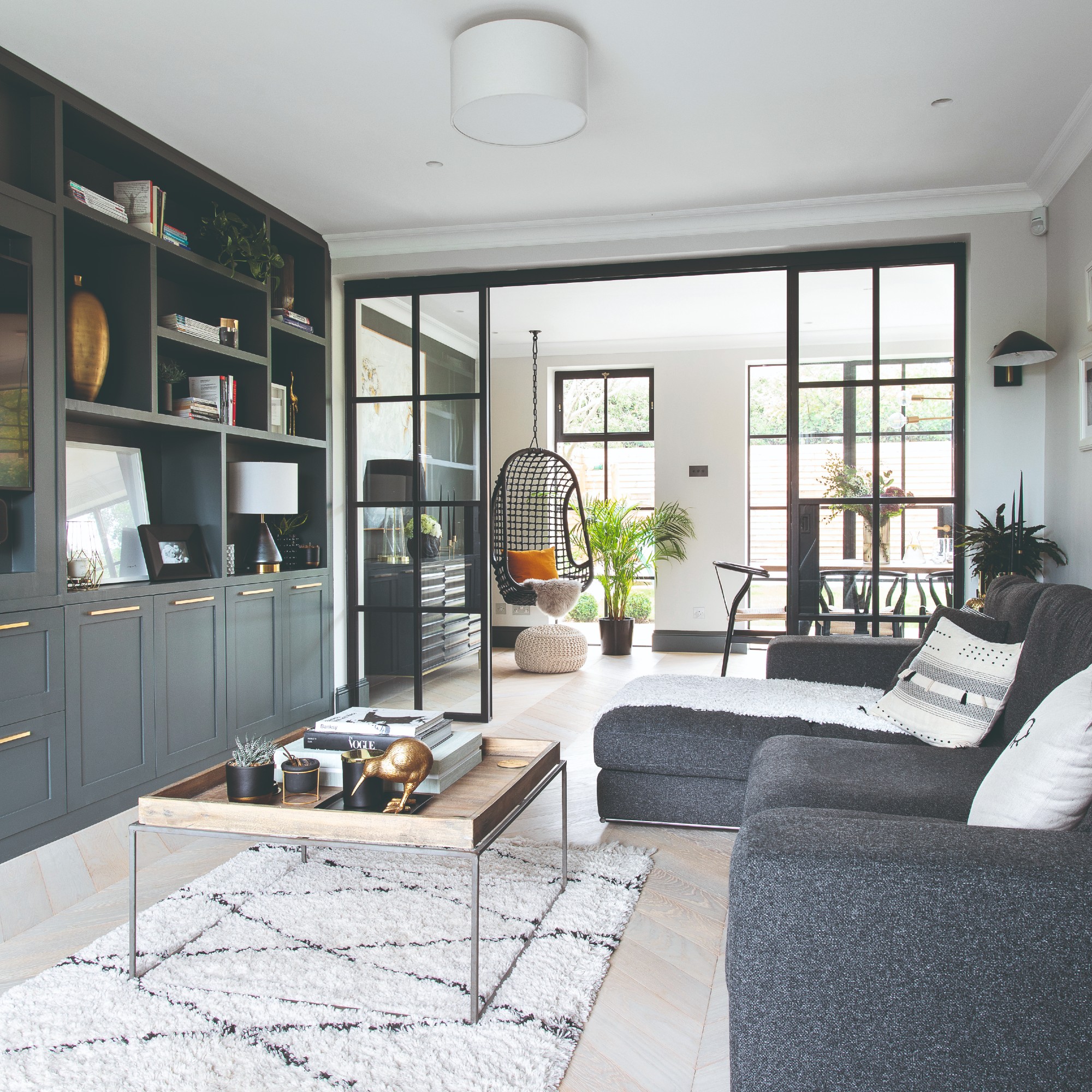
Incorporating all living room storage into one area will create a more cohesive look, as too many smaller individual pieces of furniture can make a small living room feel crowded.
One large unit spanning an entire wall in a small living room layout with TV can house the screen, media equipment, books and other essentials, with everything in one easy-to-reach place.
24. Make a floating media centre
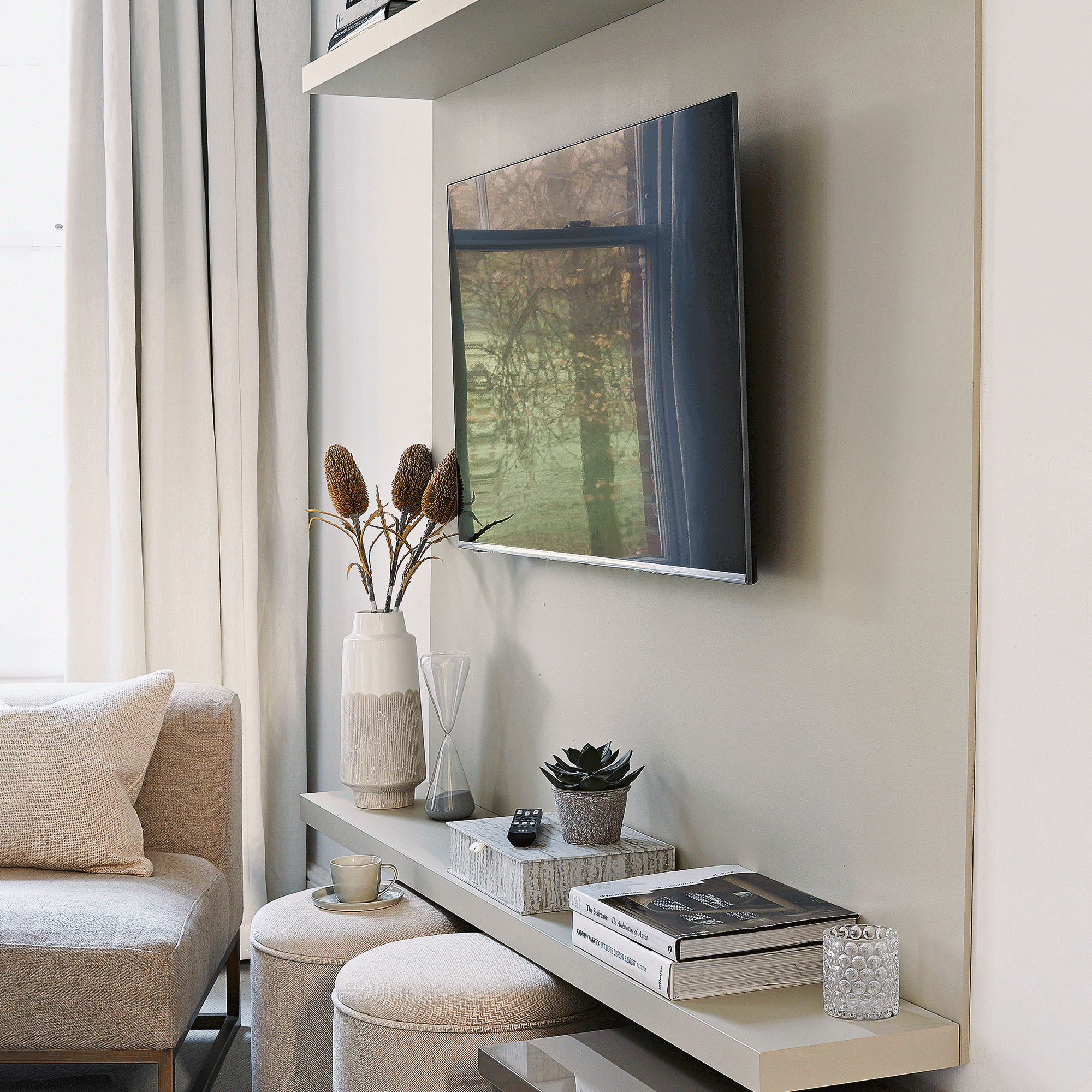
To free up floor space from storage units, you can create your own media centre that takes up minimal space as in the image above. Fix an MDF panel to the wall and mount your TV screen and floating shelves on it, one above and one below if needed.
The space-saving shelves will allow for storage without taking up too much needed space. The area underneath the bottom shelf allows for extra storage for items such as slim drawer units or drum storage stools.
Small living room wall decor ideas
25. Go oversized with artwork
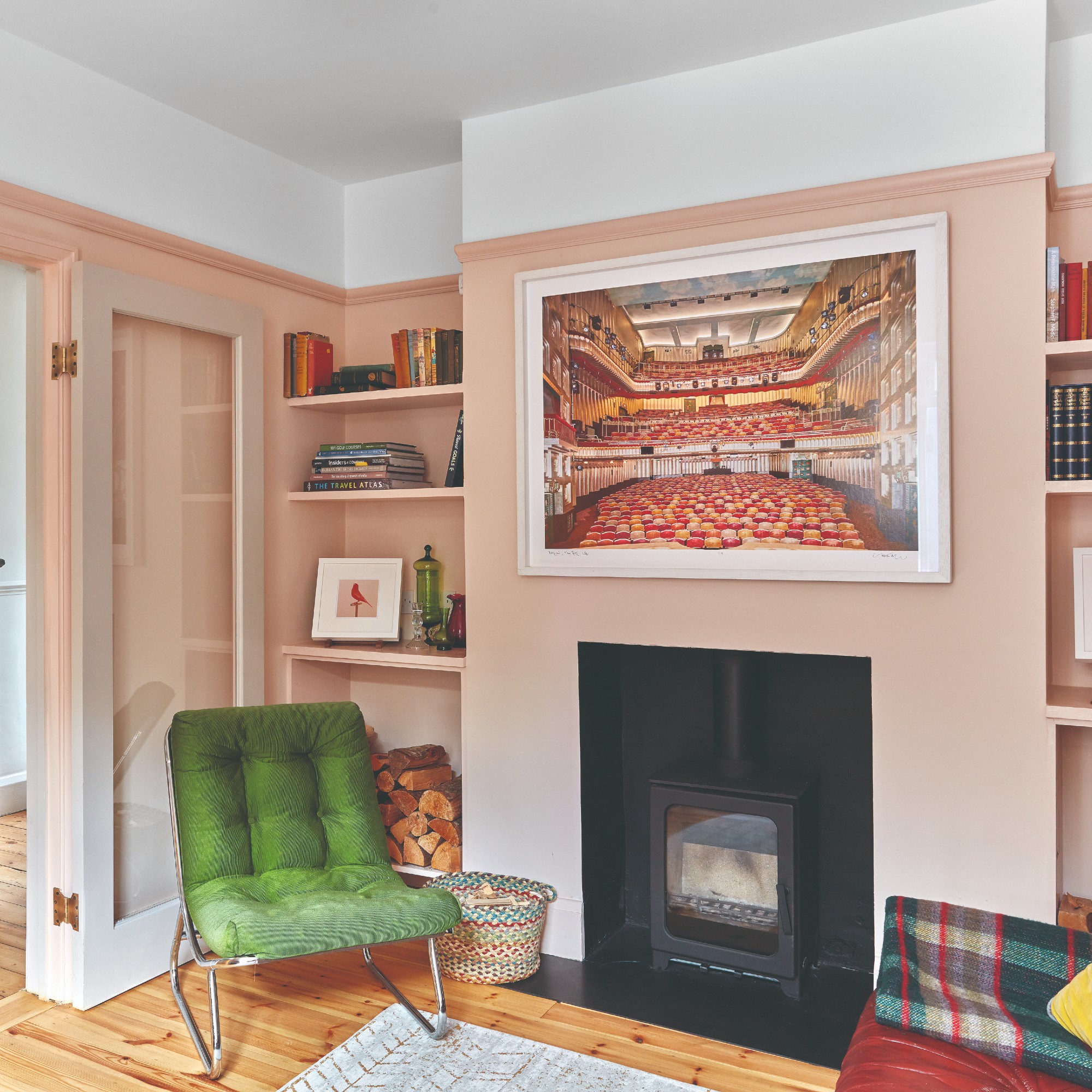
A gallery wall tends to be the more popular way to approach decorating small living room walls and display favourite artwork and photos. However, in a tight space, one large piece of artwork could stop the space from feeling cluttered and busy.
Here, a large artistic photo print is the standout piece of decor in a soft pink living room of a coastal Kent home, hung on the wall above a log-burning stove as the owners are avid art collectors.
26. Save space with wall lights
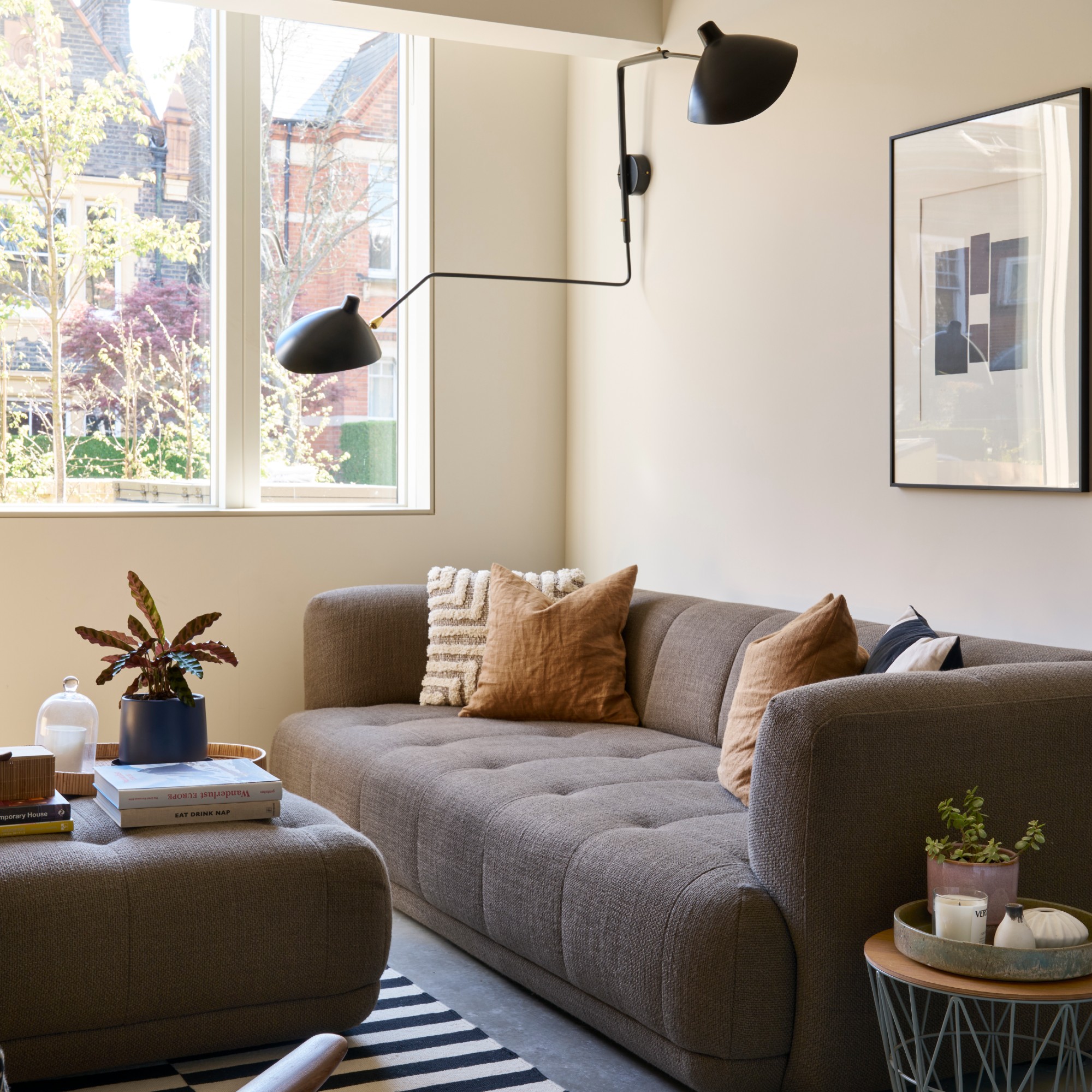
In small spaces, it's all about saving precious floor space so the room doesn't seem too cluttered. So when choosing small living room lighting ideas, opting for wall-mounted styles will not only save space but also act as a decorative element for the wall.
This sculptural light fixture in this compact sitting room of a renovated 1950s home in London is the perfect example.
27. Go for a mural
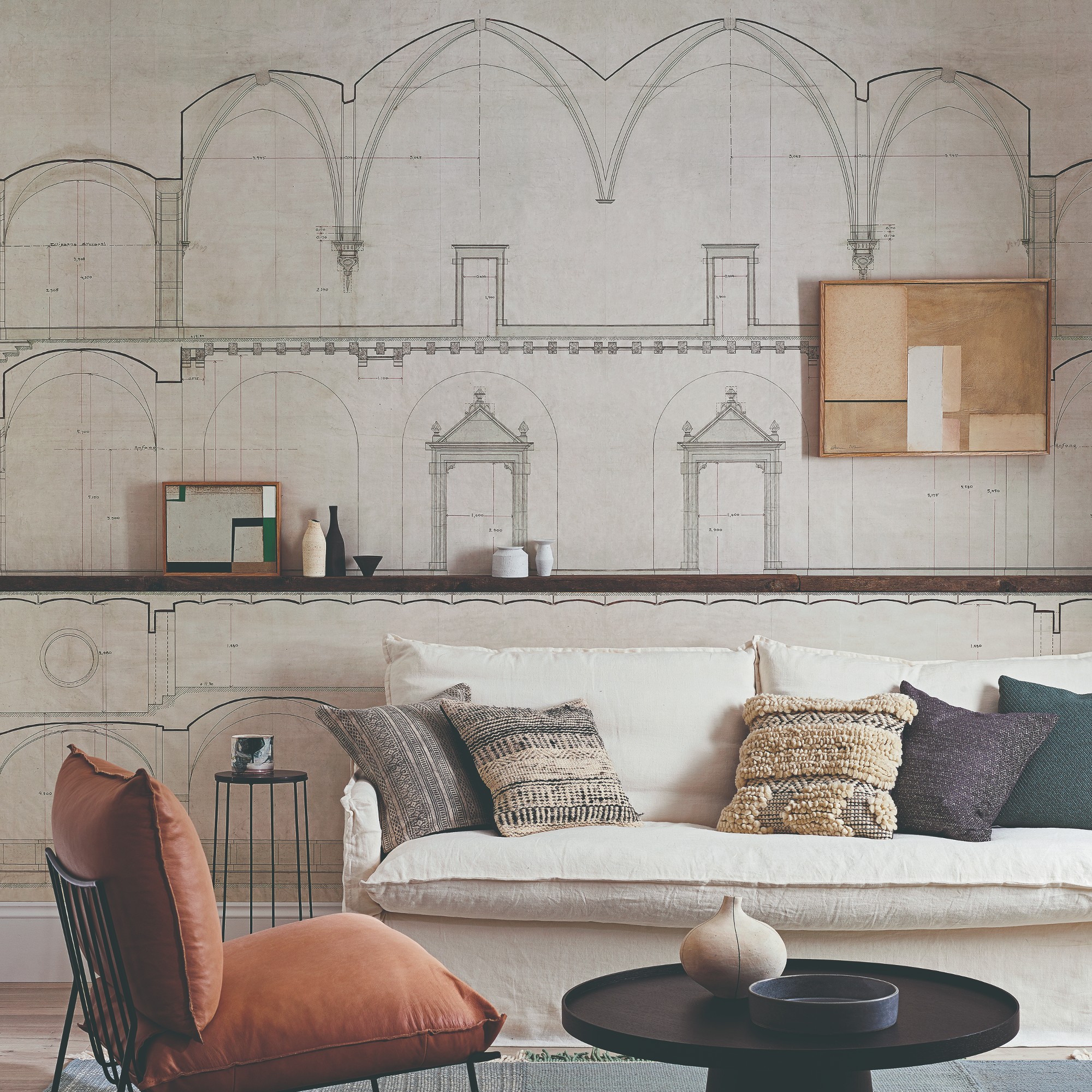
A grand design like a wall mural, much like this tropical vintage design from Dunelm, is an excellent living room feature wall idea as it can assist in making a tiny living space appear bigger.
'A way to make a room appear visually larger and more open is with a wall mural, the large-scale designs drawing the eye outwards and expanding the visual field,’ says Hannah Swift, marketing manager at family-run wallpaper retailer Beautiful Walls.
28. Pick a wallpaper with a subtle pattern
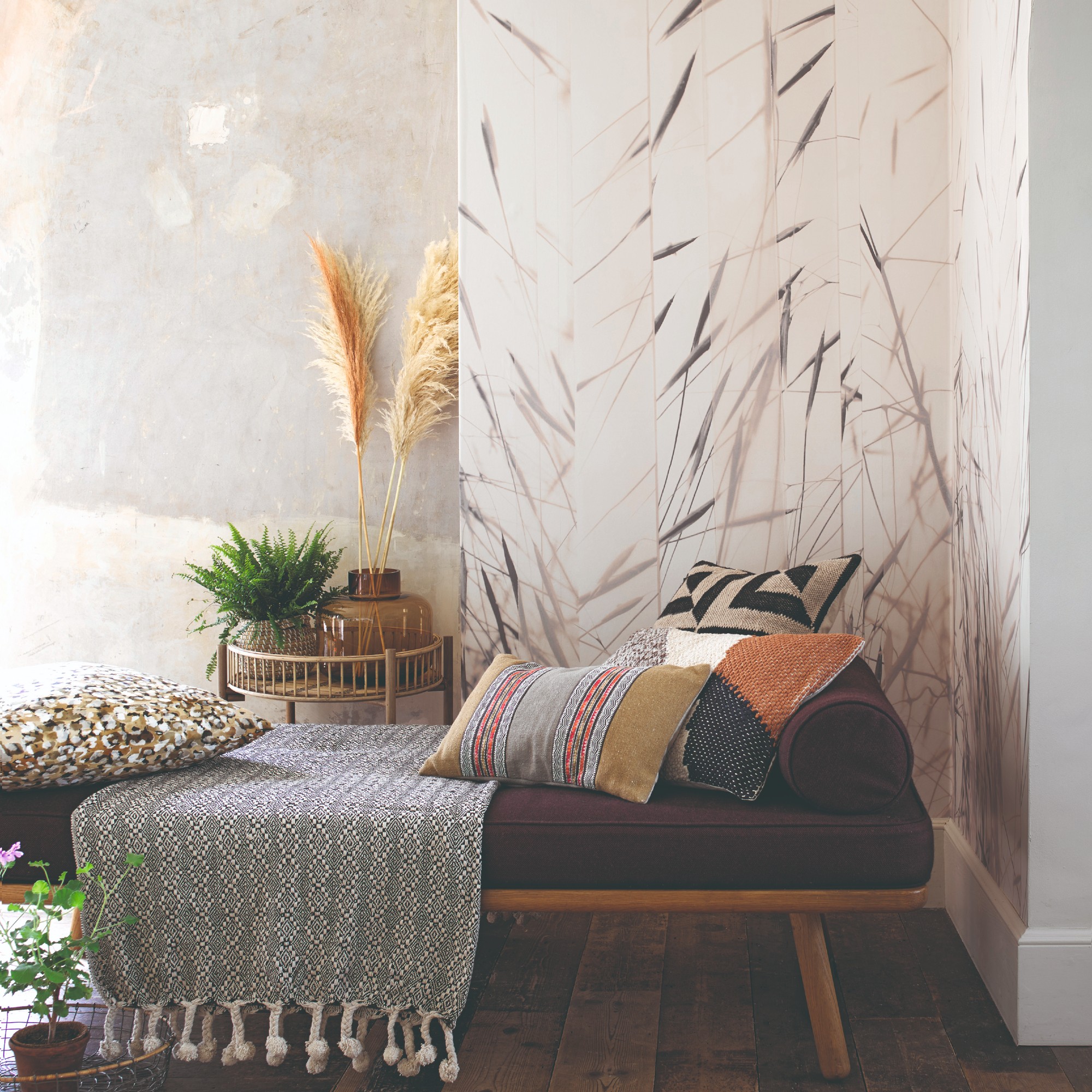
While going big and bold in a small space with large-scale prints and wall murals is an option, so is doing the exact opposite and going for a small living room wallpaper idea with a subtle pattern that won’t disrupt the space too much.
Nature-inspired motifs as in the image above will work, but so will soft waves and gentle geometric shapes in light colours.
29. Add space-saving storage
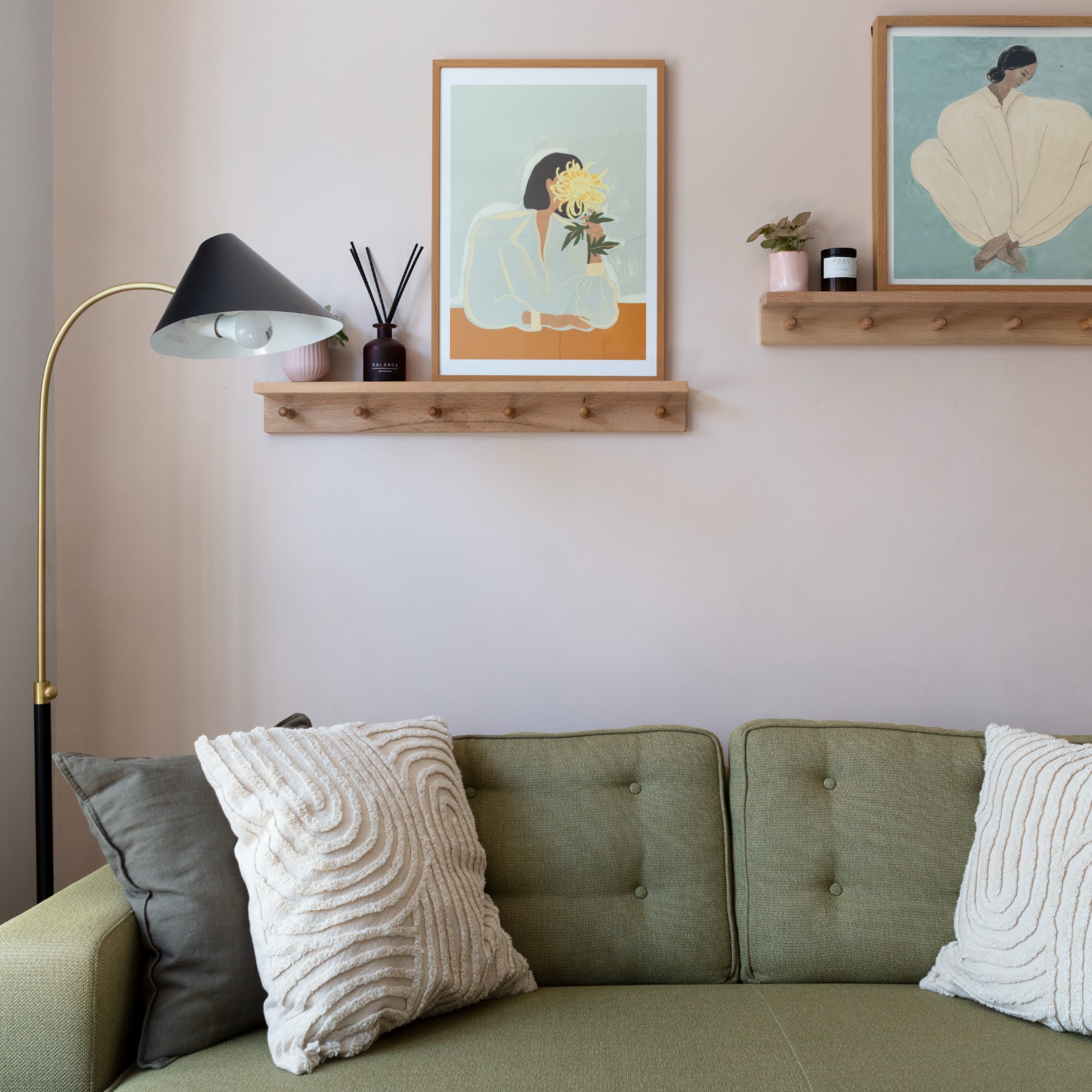
Whilst small living room storage ideas are still very much needed, many storage solutions can be large and bulky and take up too much space.
So instead, try to make the most of ceiling height by utilising the walls and adding some floating shelves as in this serene living room here. That way, you won't be using any precious floor space. These shelves even have a few pegs to hang stuff on, much like this shelf design from Amazon.
30. Elevate with wall panelling
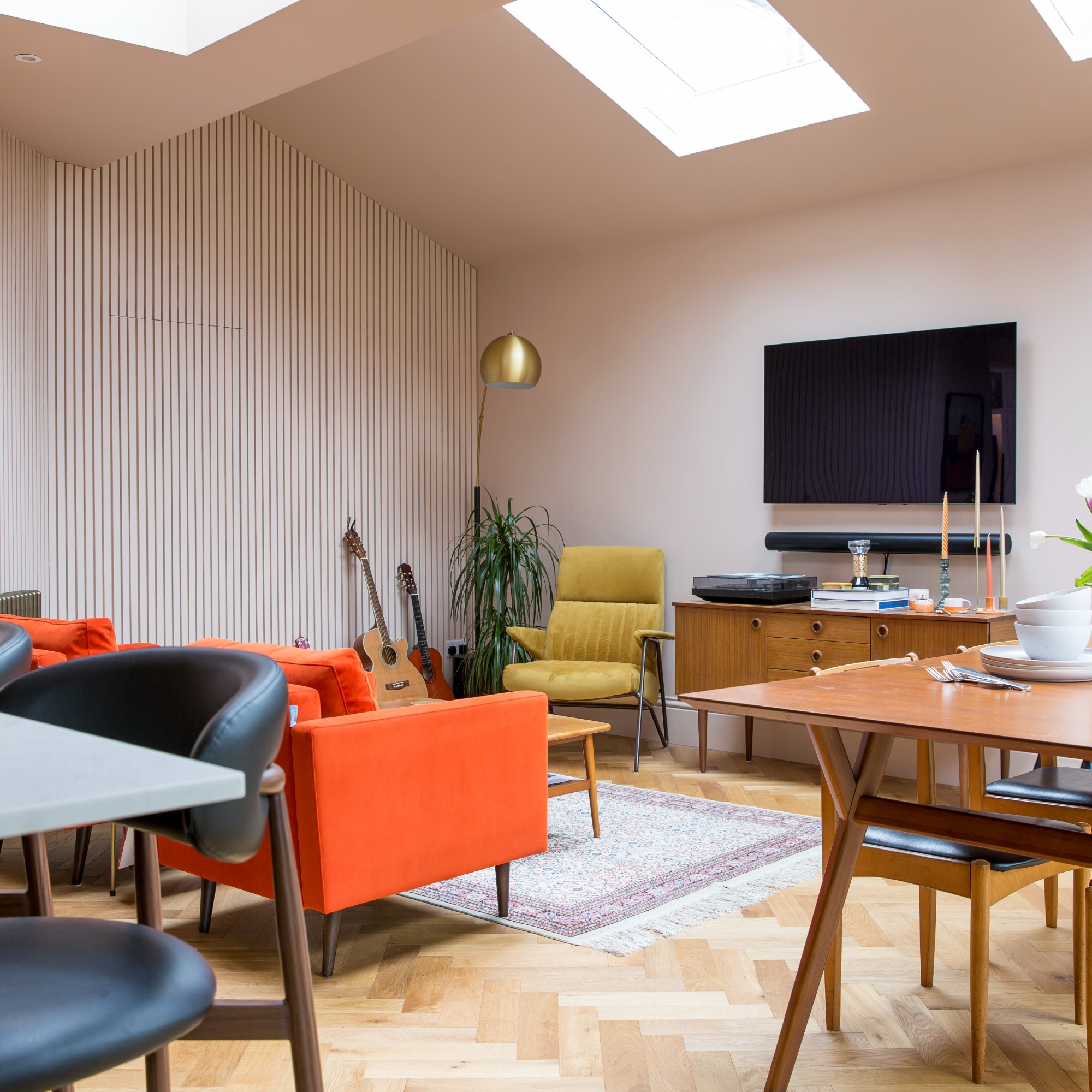
Walls can appear a bit flat and uninteresting on their own. But just by adding some wall panelling or even moulding to the walls, they'll look instantly elevated. And the best part is that it doesn't take any extra space and it's not visually busy either, so it's perfect as a small living room idea.
31. Hang baskets for extra storage
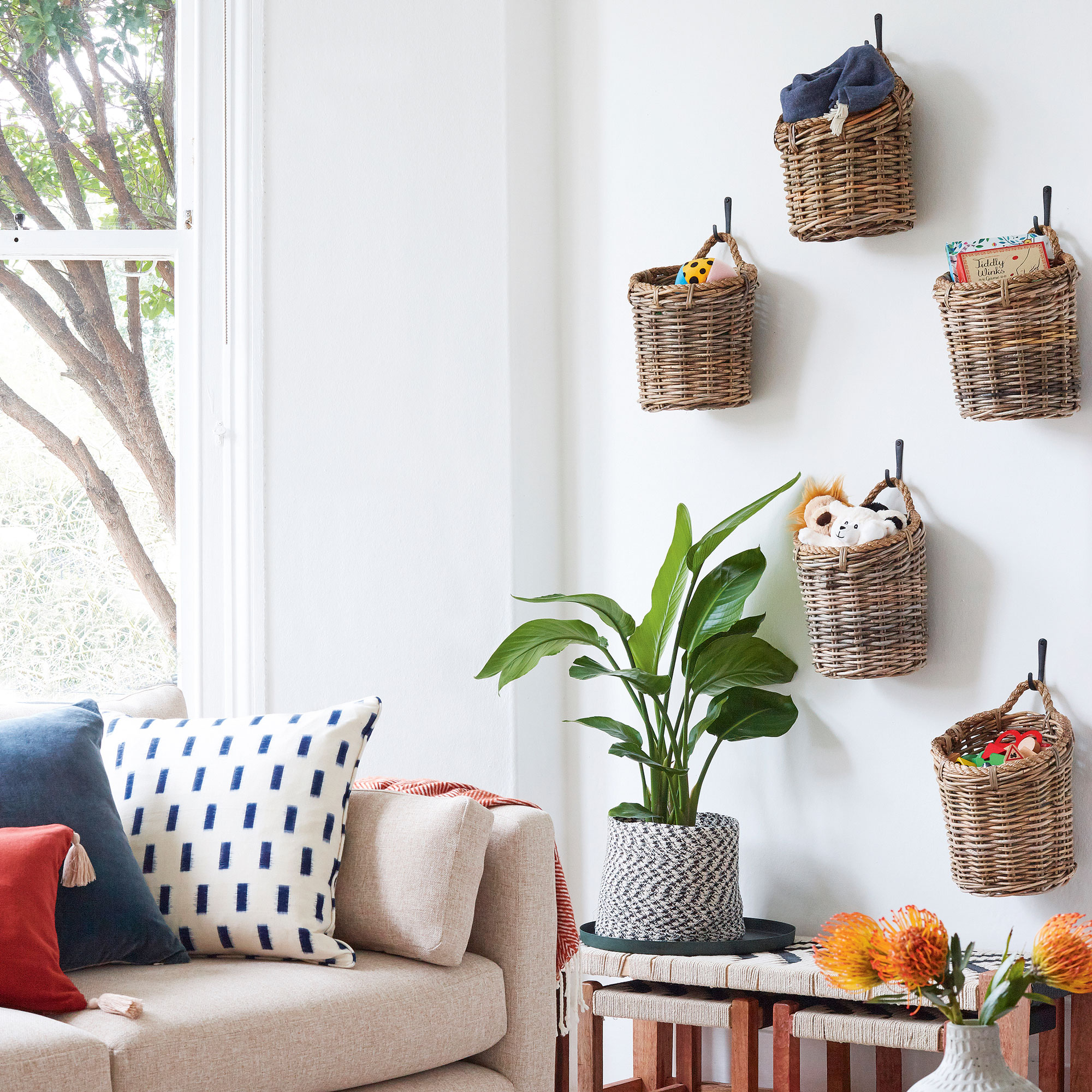
When faced with small space living, the only way really is up! Make the most of any floor space by keeping it as clutter-free as possible. That includes any small bits and bobs you might otherwise have laying around.
Willow baskets are an attractive way to solve the storage problem. Ideal because one they look great and two they are sturdy enough to hold all manner of clutter – the perfect small living room toy storage idea.
Small living room furniture ideas
32. Soften with curved edges
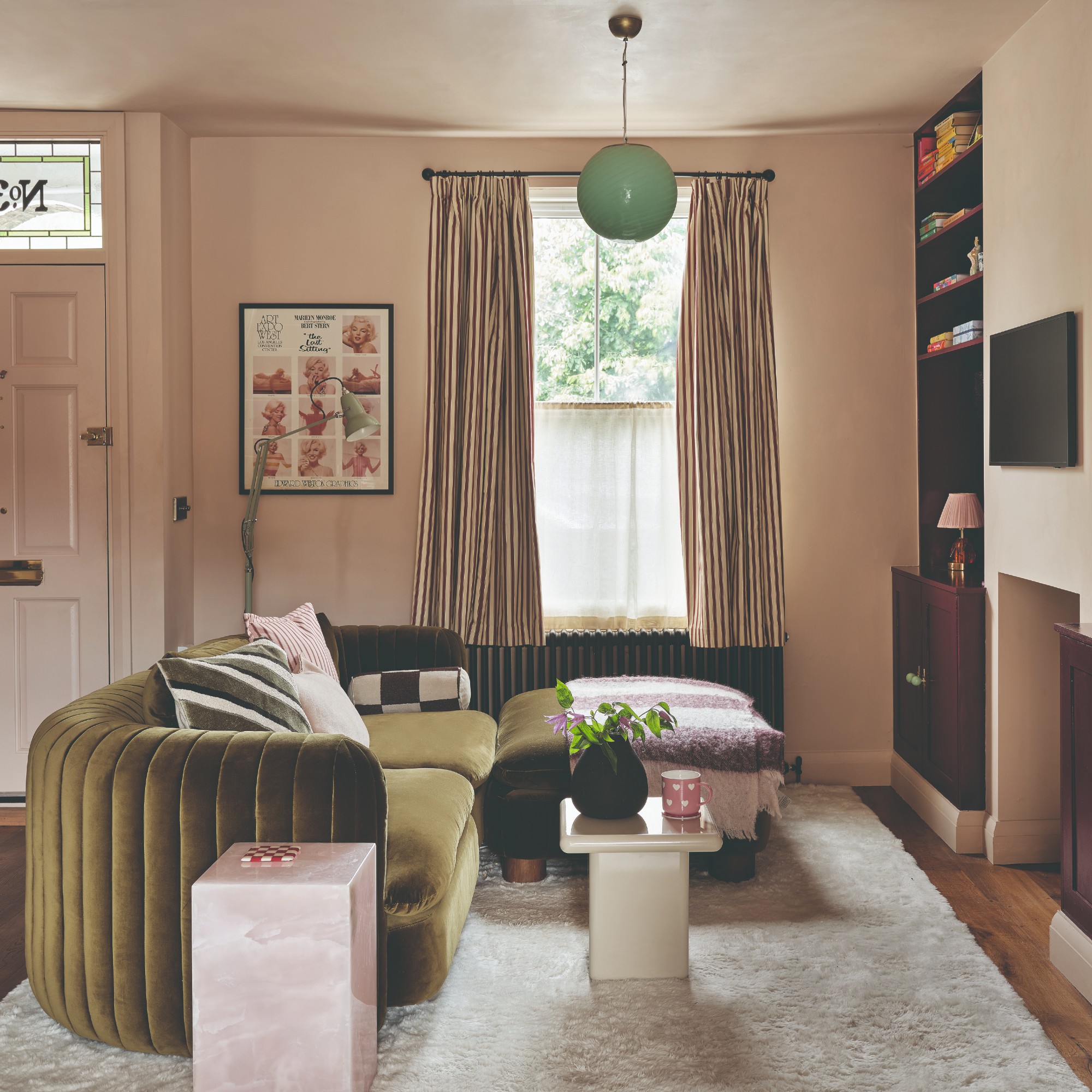
When furnishing a small living room, it's best to look for furniture with curved edges to offset all the harsh angles, from the doorframe to the windows. An oval midcentury coffee table in warm wood or a round ottoman can soften the look of a small living room, and so can a curved sofa like the John Lewis Flow sofa, similar to the beautifully curved, pleated sofa design in olive green in the picture.
Circular cushions work well too, as do round rugs like this circular jute rug from La Redoute, available in a range of sizes (go as big as possible). Curvy furniture, soft furnishings and even the cute rounded leaves of a money plant will make a small living room feel inviting.
33. Build in
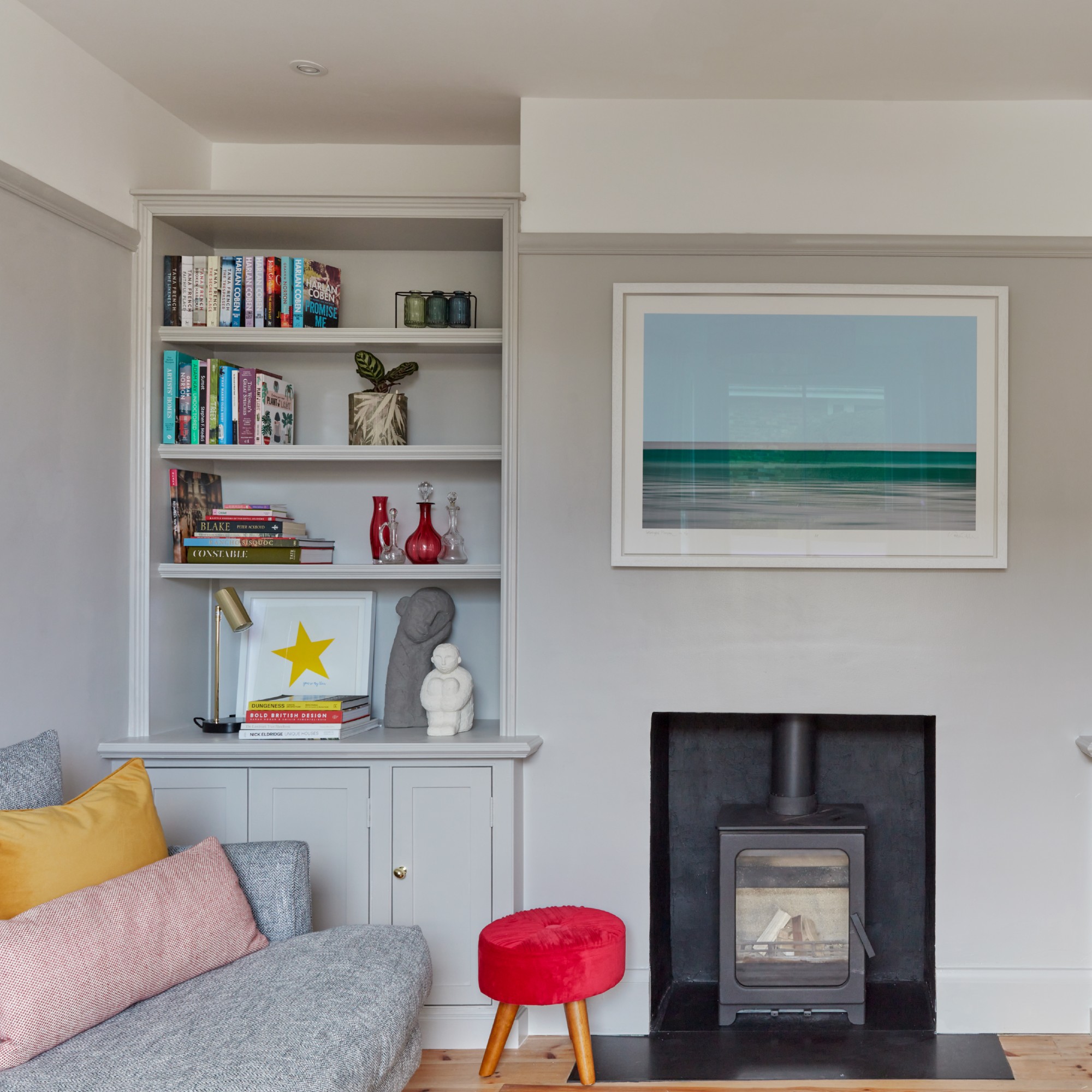
There could never be enough storage in a room. And this is especially true when it comes to small living rooms. That's why opting for build-in solutions is both the most efficient and seamless.
Built in shelving and cupboards are much better space savers than freestanding. But a built in seating area, too, will mean no space is wasted at all, especially if you add under-bench storage too.
34. Prioritise multifunctional designs
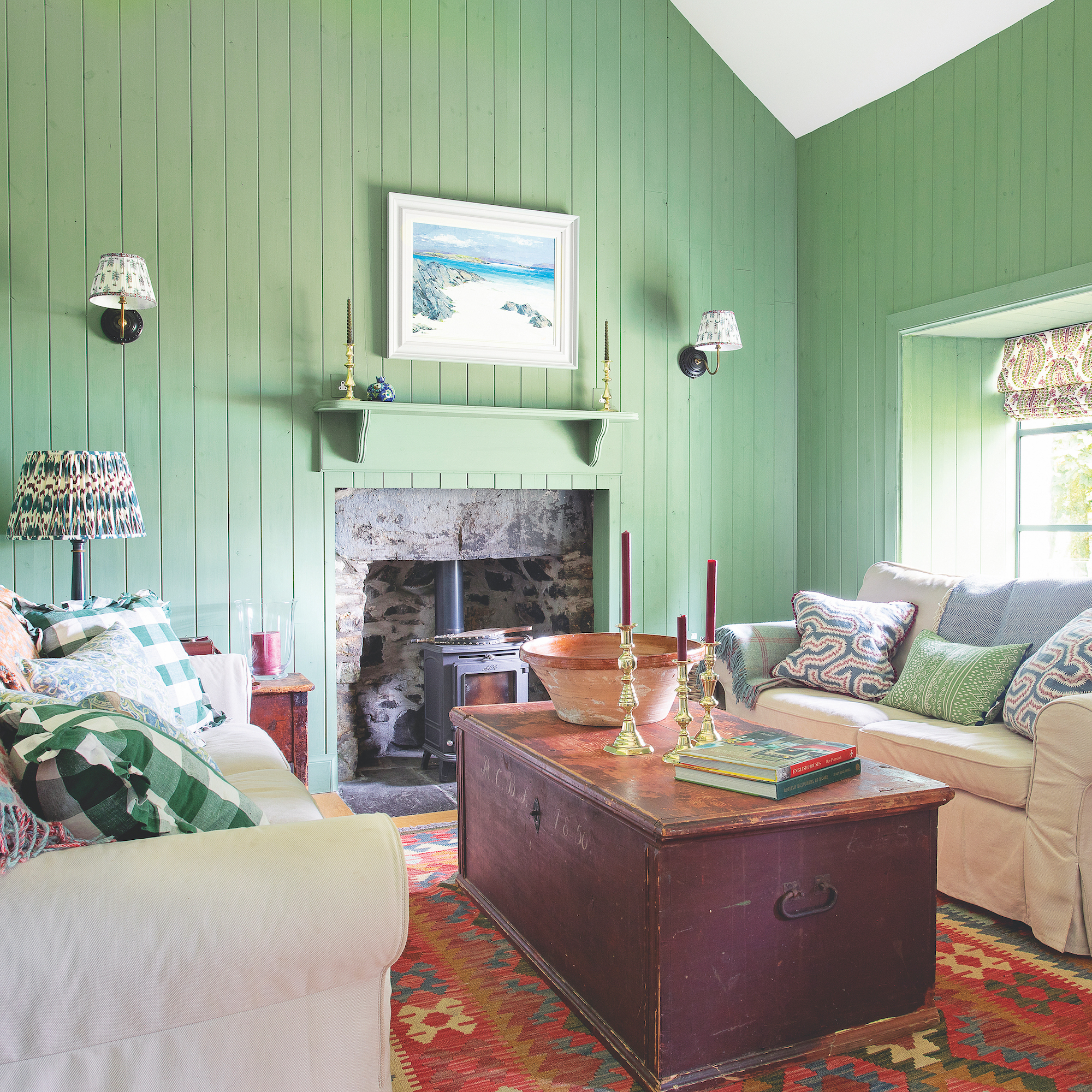
As already mentioned regarding choosing a sofa bed over a traditional sofa, every piece of furniture in a small living room needs to work double hard.
It can be a storage ottoman, a fold-out coffee table like this one from DUSK or, in the case of Lettie and Stephen's Scottish seaside cottage and their green panelled living room, an antique trunk used as a coffee table while also providing extra hidden storage.
35. Let the furniture float
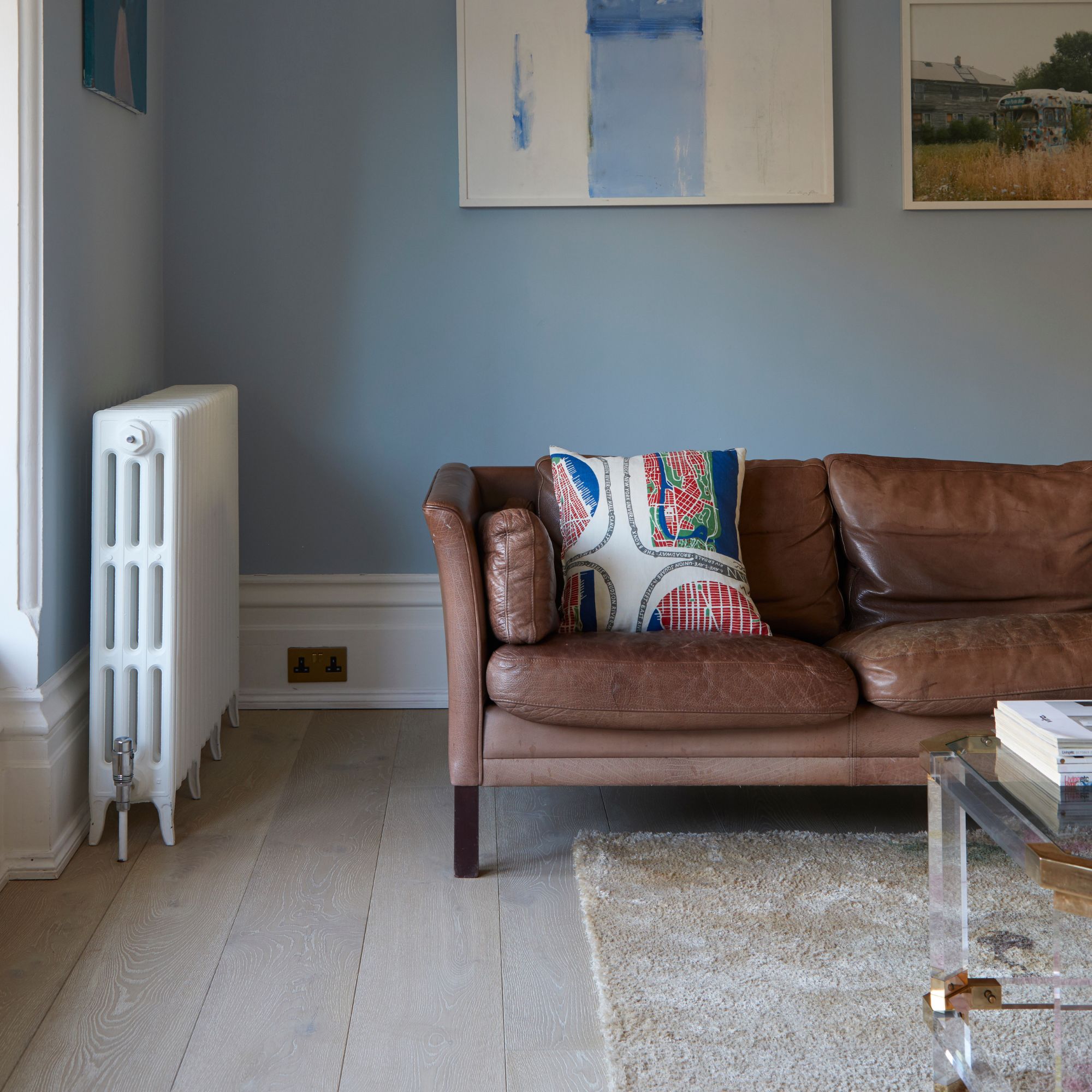
When arranging a small living room, it's common to instinctively want to push all the furniture against the walls and create as much space in the centre of the room as possible.
And yet one of the most key small living room design rules interior experts swear by is to let furniture float, whether that’s by pulling it away from the walls ever so slightly, adding legs onto furniture or mounting pieces onto the wall. This approach will create an airy feel and the illusion of more space.
36. Incorporate a sleek armchair
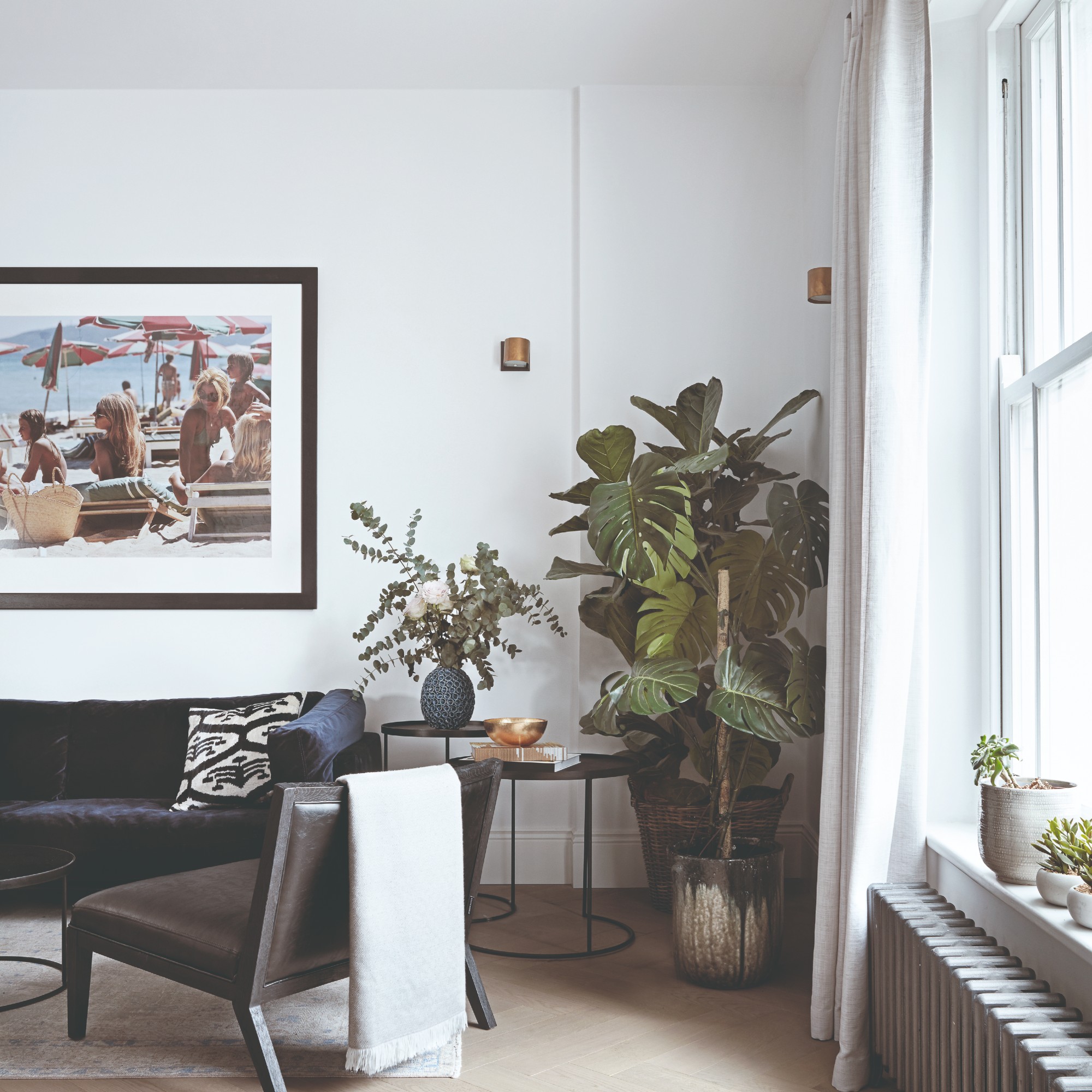
In a small living room, the key is to not overwhelm the space with furniture, but you can include an armchair to maximise the available seating if you're smart about the design.
Midcentury modern styles with elegant arms and legs work particularly well. Or you might even be lucky enough to snap up an Ercol armchair on eBay for a bargain price or opt for the one from Ercol's collaboration with John Lewis.
37. Add glass furniture
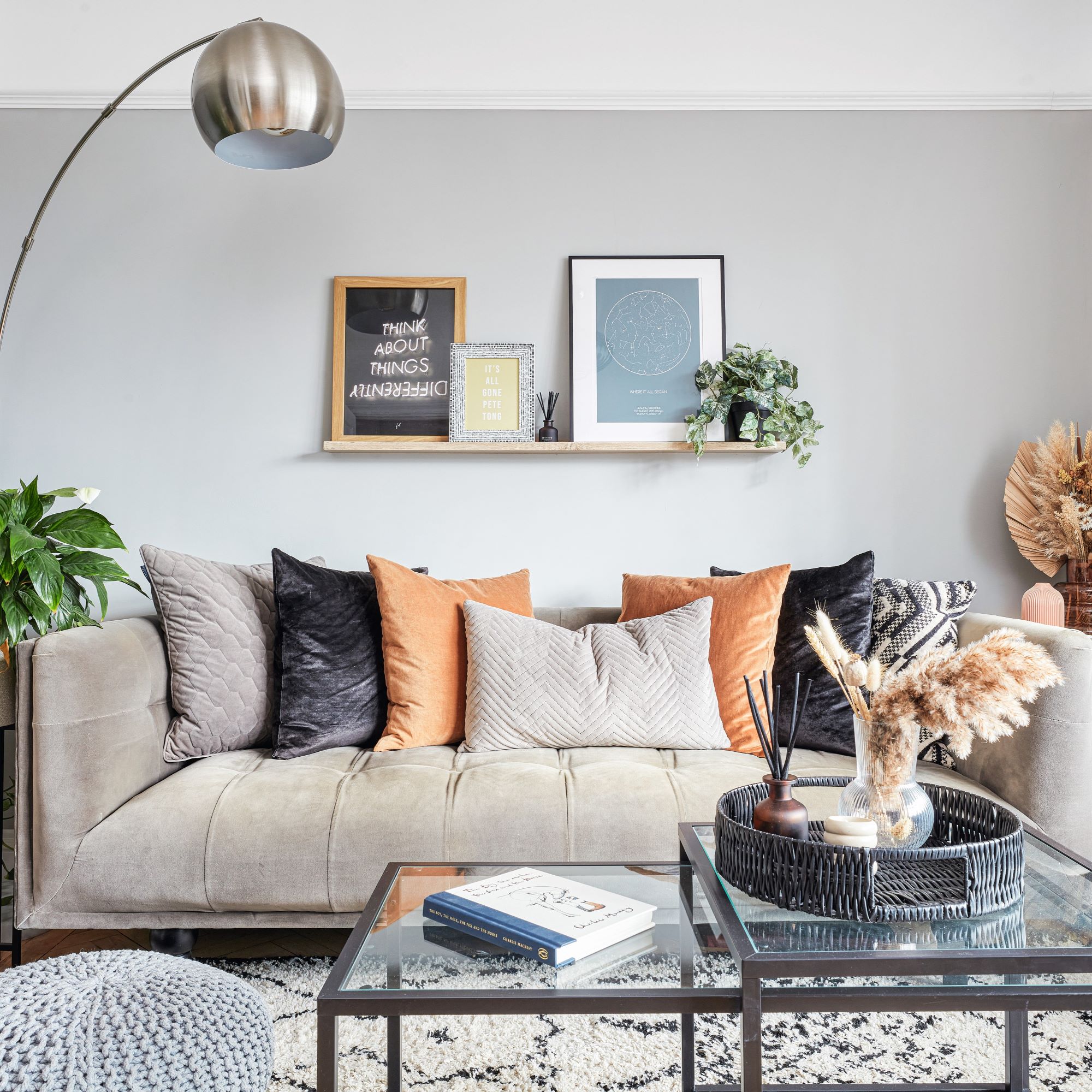
To avoid the room looking cramped and cluttered with too many pieces of furniture, it's ideal to look to materials that are barely there. Glass is the perfect example as it's transparent and therefore appears airy, almost floating.
You can opt for a glass coffee table like Steph and James Wright in their lounge of their newly renovated Reading house, creating a very modern living room idea.
38. Opt for light-wood furniture
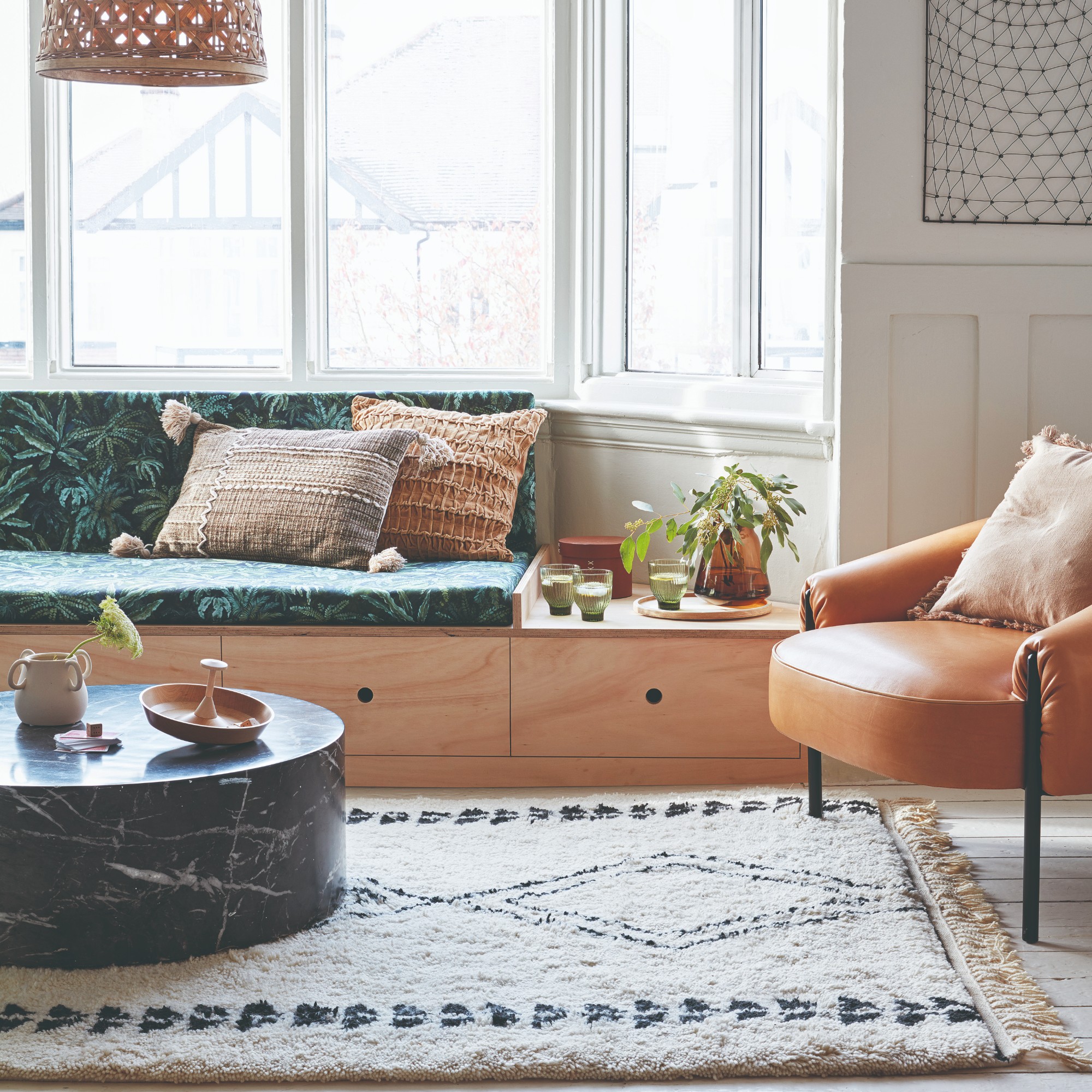
Even though dark wood furniture is trending this year and it can look incredibly stylish in most spaces, it's recommended to steer clear of dark wood in a small living room, unless it’s through smaller accents.
‘Opt for lighter tones with your furniture, as this instantly makes a room feel bigger and brighter,’ says Monika Puccio, interior expert from Sofa Club. ‘Think warm but light wooden tables, shelves, or side units. This will still create dimension without making the area feel too small.’
Small living room styling ideas
39. Incorporate plenty of texture
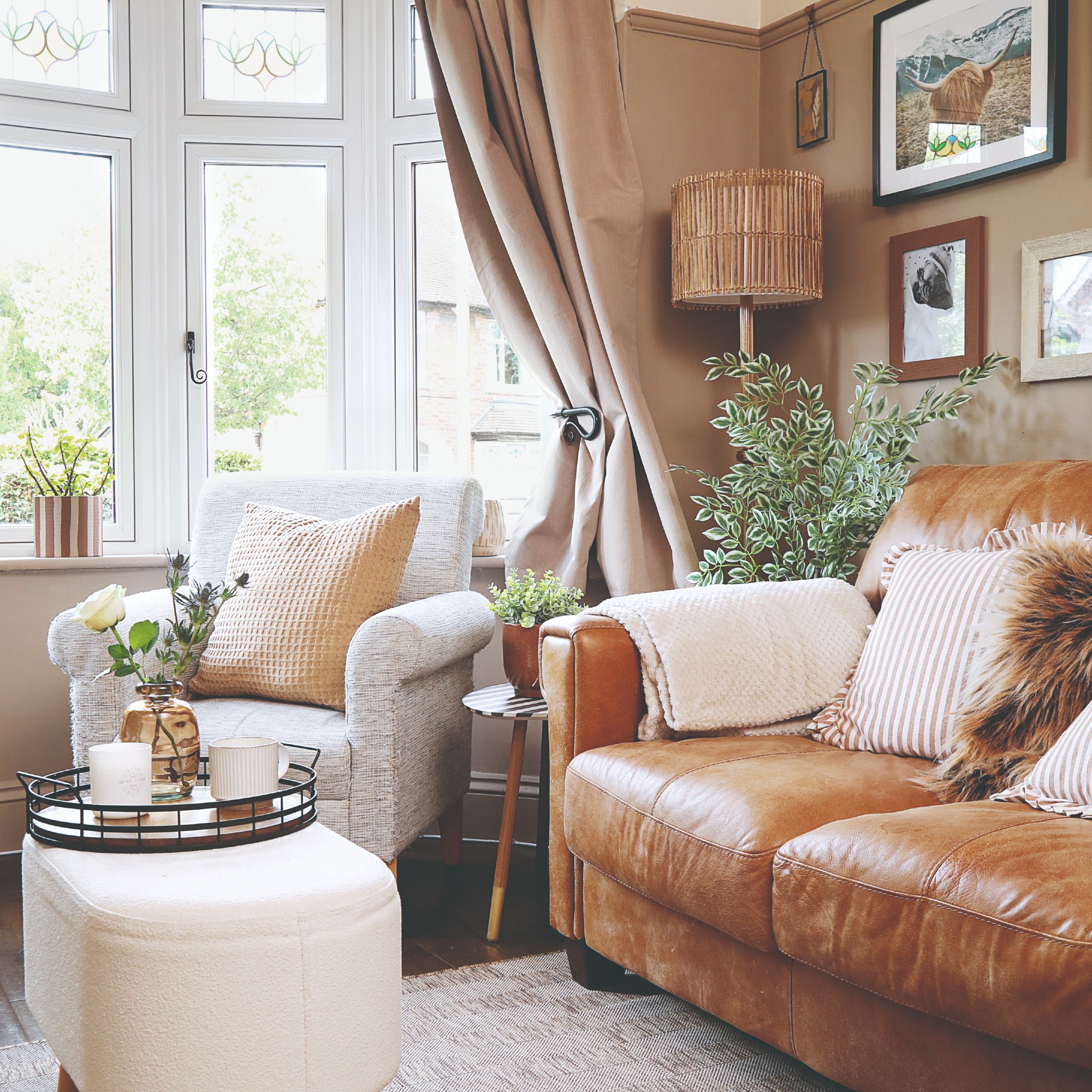
Texture is one of the most important design elements in any room, even Kelly Hoppen says so. And that’s especially true in a small room like a tiny lounge – not incorporating enough textural variety is a common small living room styling mistake which ends up making the room look flat.
But it's definitely a mistake that Emily May did not make with her childhood home makeover, especially in the lounge which is brimming with varied textural finishes.
40. Don’t go overboard with soft furnishings
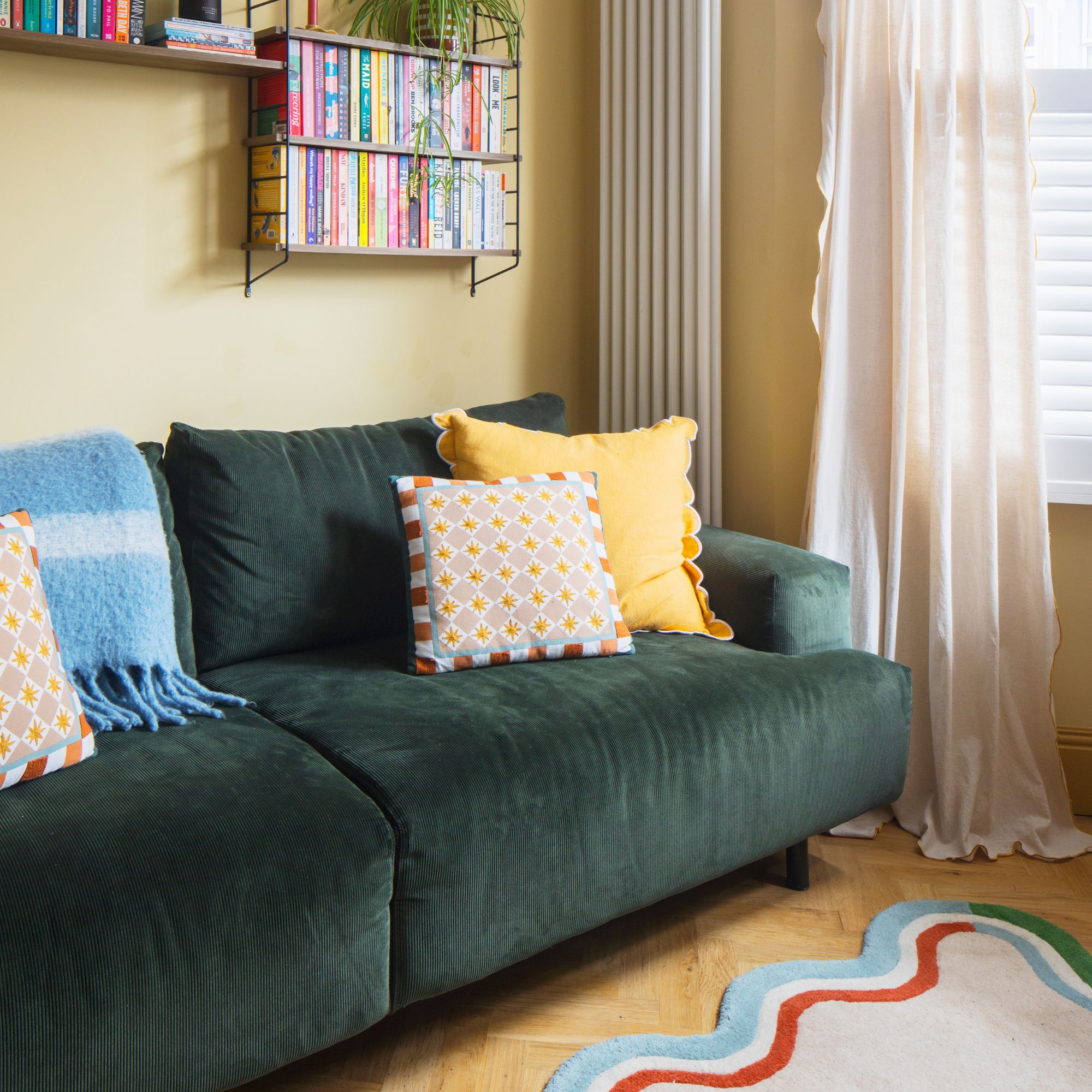
Just like with furniture, accessories should also be highly curated as adding too many can easily result in a cluttered look – which is not exactly desirable. And while most people already know that, there is one area of the living room where this mistake is made quite frequently – and that’s the sofa, often covered with too many cushions and throws.
However, this sofa right here shows not only a great level of restraint in the amount of soft furnishings adorning this sofa, but also all of it works together harmoniously which is key.
41. Layer your lighting
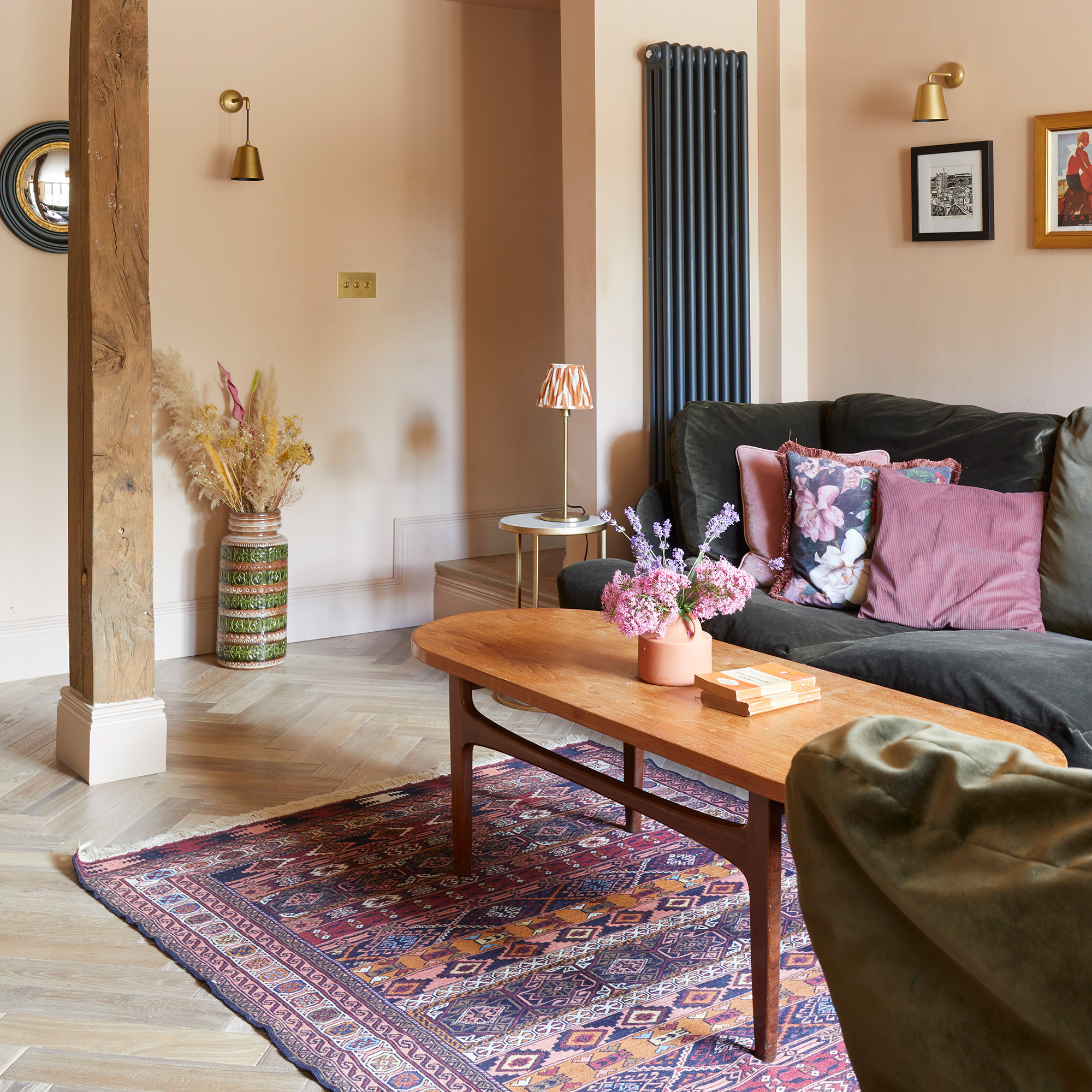
Having a small living room doesn’t necessarily have to be a bad thing because it’s easier to create a cosy atmosphere in a smaller space. And cosiness is one of the top requirements we all have for our lounges. So why not lean into the cosy look and feel and further enhance it with the right living room lighting ideas?
We're currently experiencing the 'death of the overhead lighting' in favour of ambient lighting instead. And layering your lighting, incorporating multiple sources of light is the recommended way to lighten up a living room small or large.
42. Play with characterful furnishings
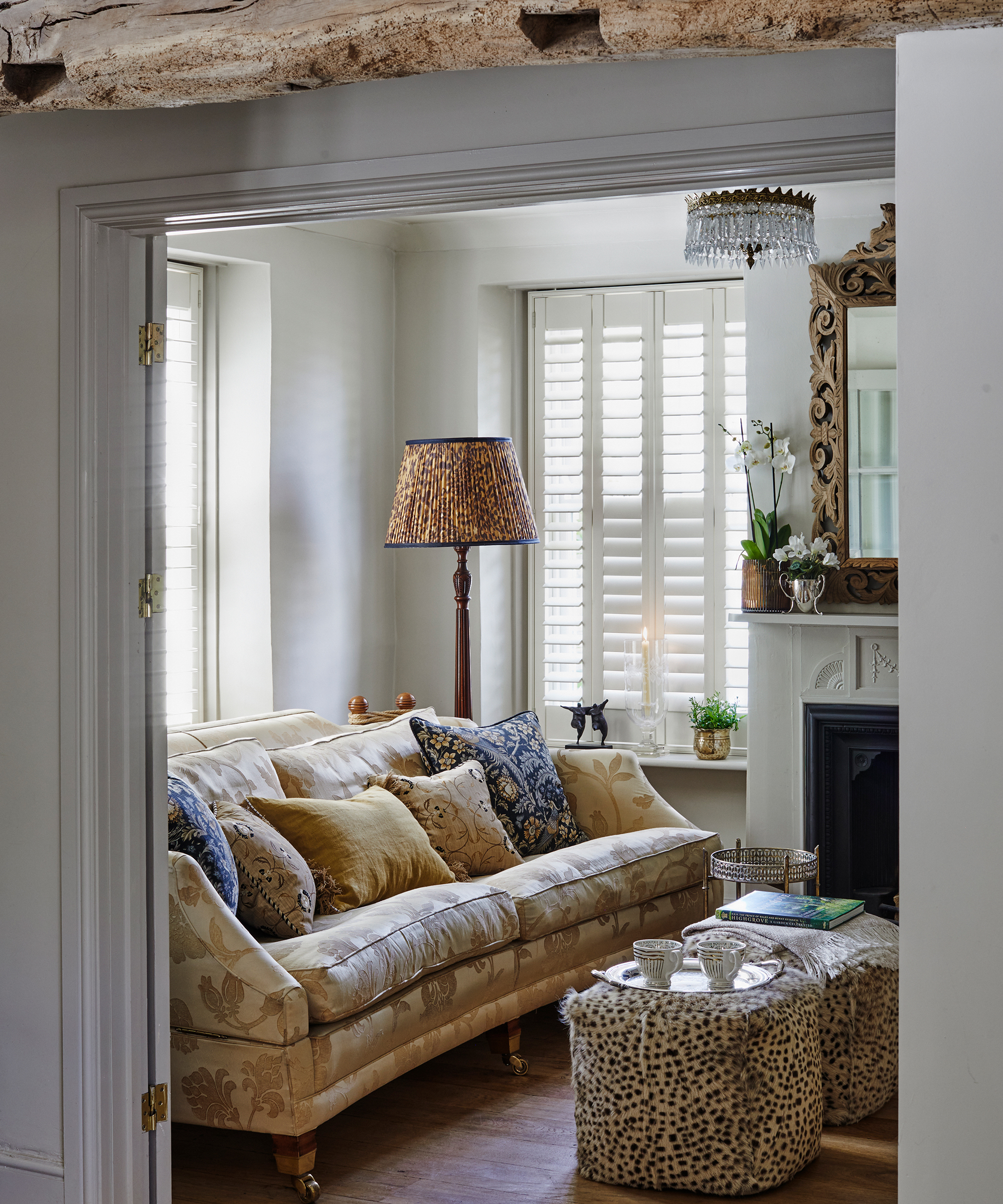
Banishing clutter might help a small living room feel more open, but small doesn't have to mean bare and characterless. Adding a mixture of accessories, a combination of well-loved pieces and new ones, will result in an interesting, character-filled scheme, no one will be thinking about how small the room is.
This is the approach Emma and Peter Dellicompagni took when decorating the compact living room of their Cotswolds townhouse, injecting pops of animal print through pouffes from Oka and a lampshade set against traditional country house damasks.
43. Create the illusion of space using mirrors
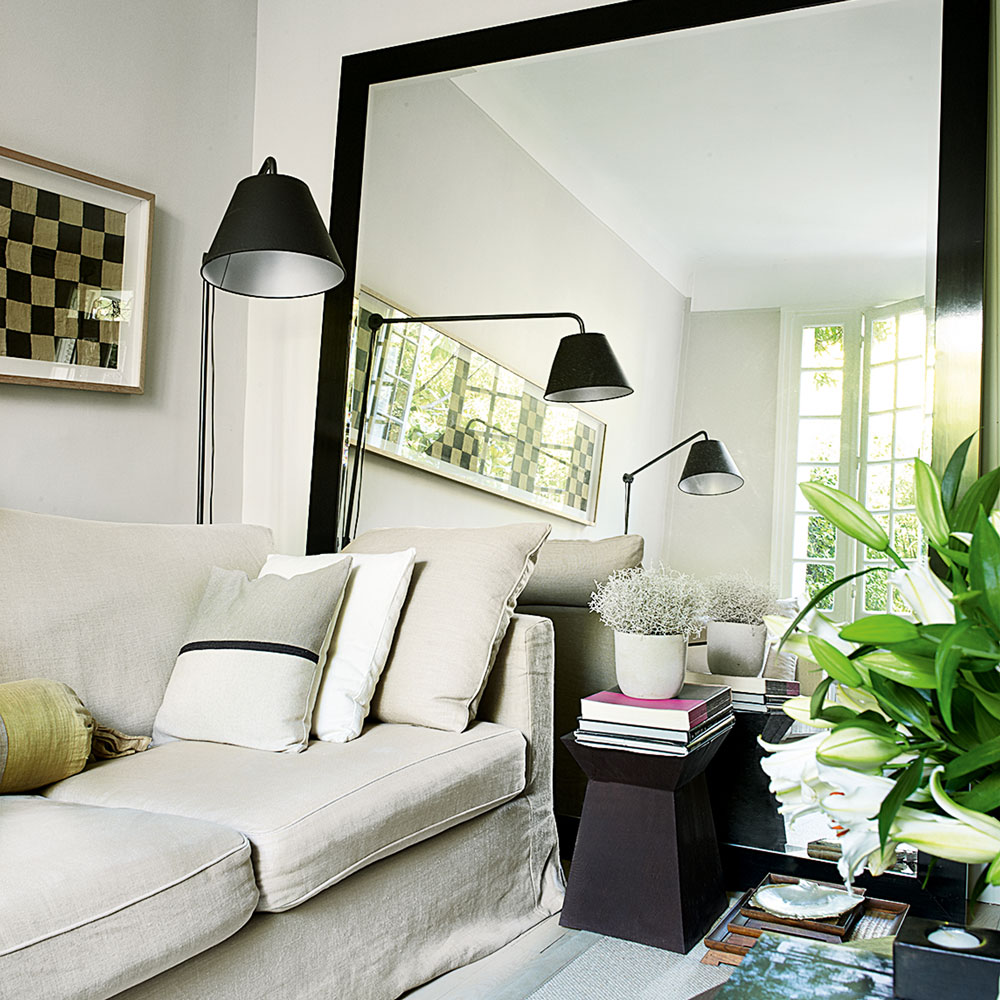
It's the oldest trick in the book, but it really does work. You can instantly create the illusion of space by simply adding one or a couple of mirrors.
All the better still, like above, by opting for an oversized mirror to cover an entire wall, the mirror will create the illusion of space by reflecting light and, of course, the interior decor, visually expanding the space.
44. Add plenty of plants
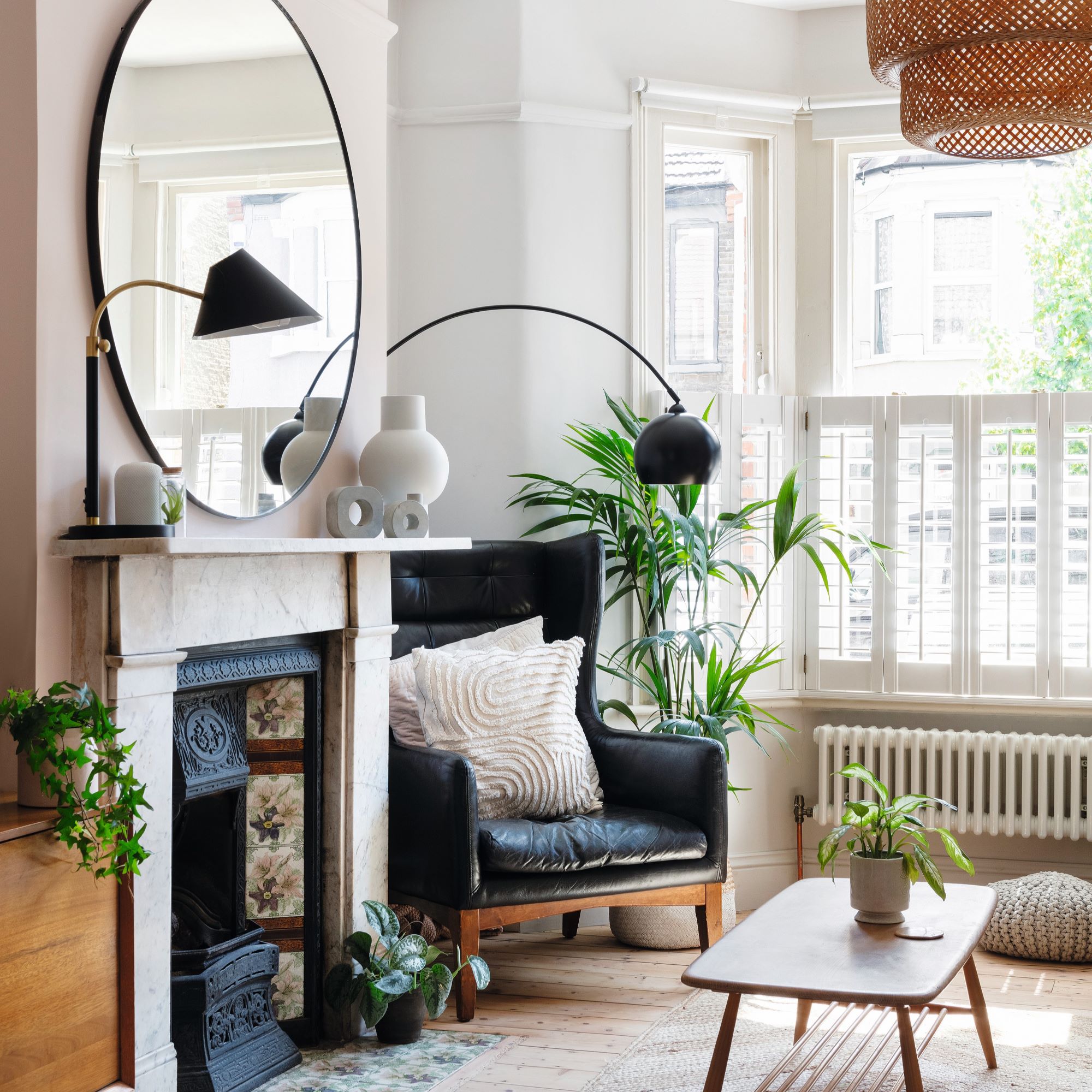
Incorporating nature and greenery through adding houseplants will liven up a small living room, add colour and also that aforementioned texture.
You can see how it brightens up Kat Collins' and Toby Sealey's living room in their peach-coloured Scandi-style home as pictured above.
Small living room flooring ideas
45. Install light-coloured flooring
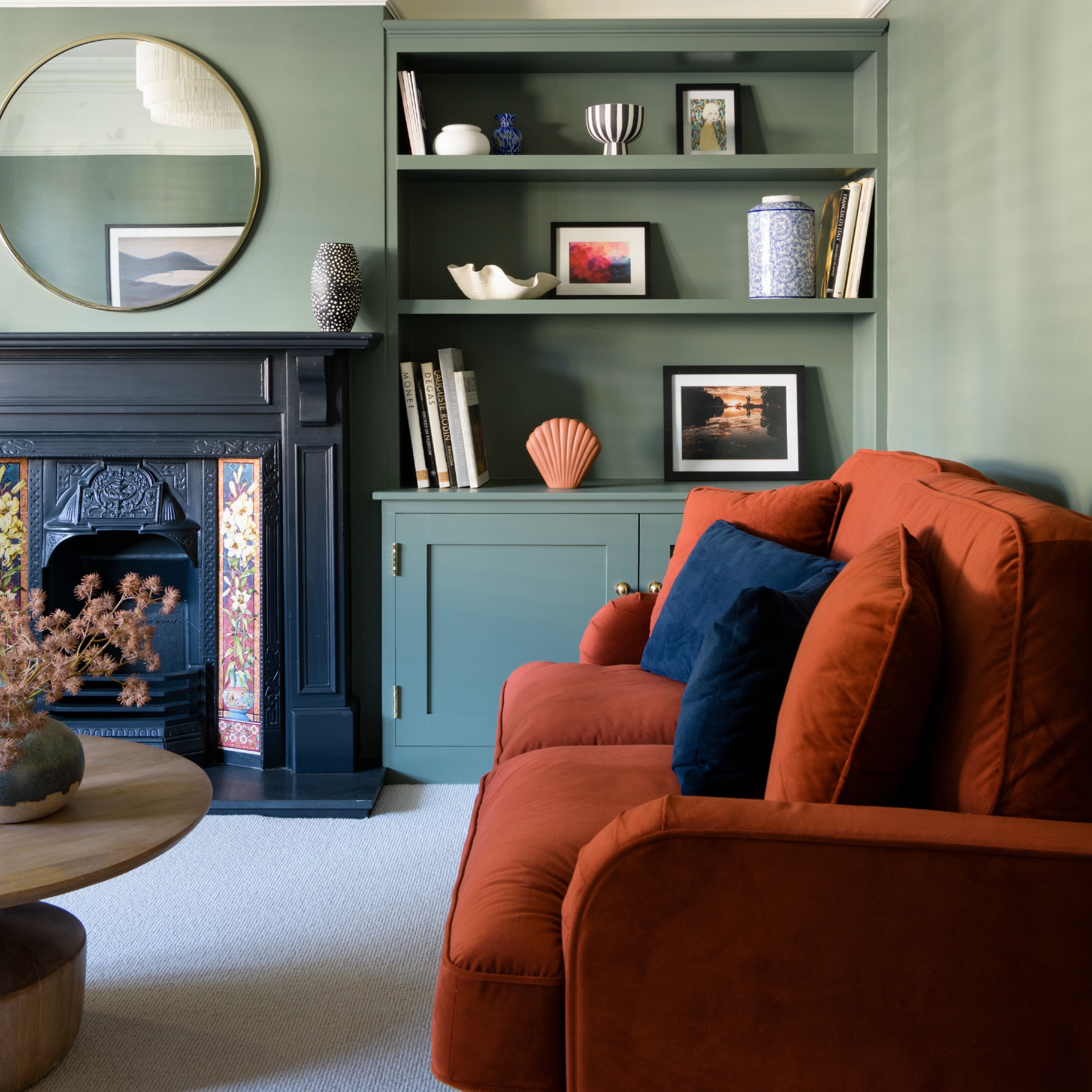
Just like opting for lighter shades on the walls will make your small living room appear larger, light-coloured living room flooring ideas will have the same effect, whether it’s carpet, a rug or a parquet floor.
Jenny and Sam opted for a cream-coloured carpet in the living room of their 1930s semi-detached house. 'I have three style rules that I’ve used throughout the house; I start with a neutral base, sit that with darker tones and then add wooden accessories to inject depth and warmth,' Jenny says.
46. Go big with a rug
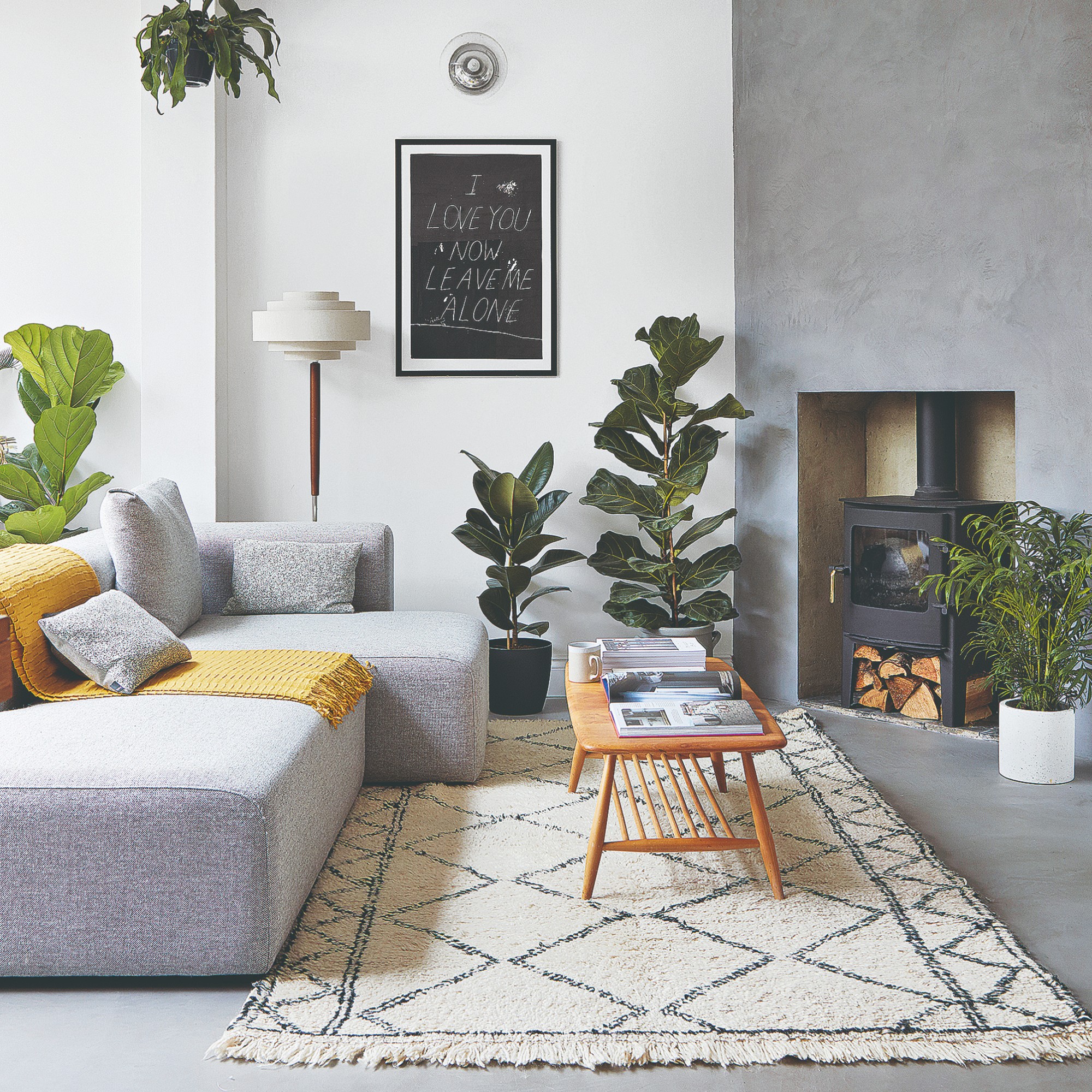
Rugs can often be overlooked when decorating a small living room. But they really shouldn't be. It brings that much needed texture, warmth and cosiness and it anchors the seating area. But only as long as the size of it is big enough. If the rug is floating like an island between the furniture it will only make the space look smaller, so going bigger is always better.
But one should always look to the 18 inch rug sizing rule for guidance and and make sure that at least the front legs of the sofa are on top of the rug, much like they are in the image above.
47. Enlarge with wide flooring
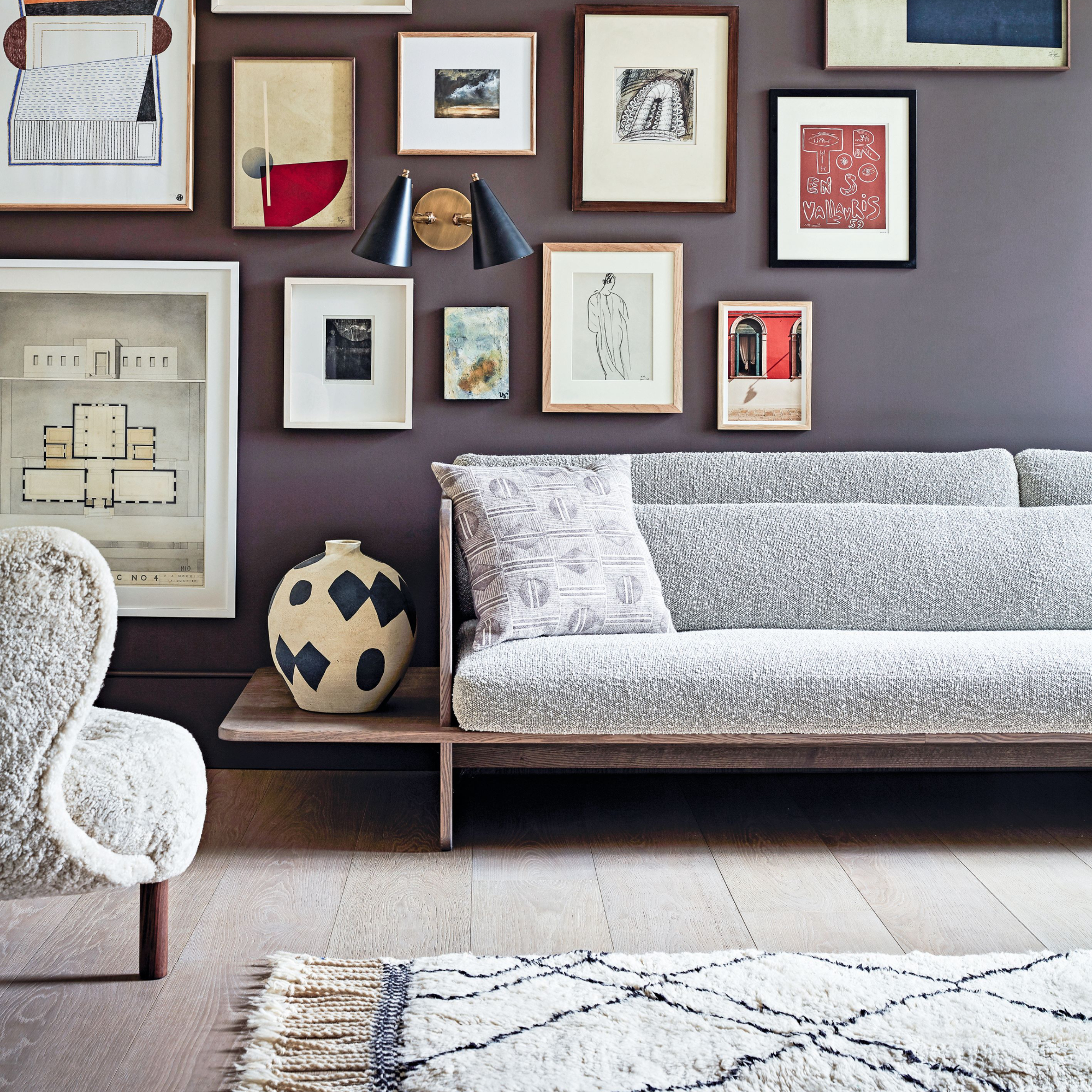
Elements of the room with large surface area, like the walls and floors, have a huge impact on how a small space feels. Opting for living room flooring options with a larger, wider pattern like the wide floorboards here will help to visually expand the space.
'Use wide flooring planks or those laid on a diagonal tangent across the room,' says interior designer Vanessa Morgan. Chunky floorboards will work better than slim ones, and a Berber rug with a diamond pattern will also create the impression of a broader area.
Small living room window dressing ideas
48. Opt for floor-length curtains
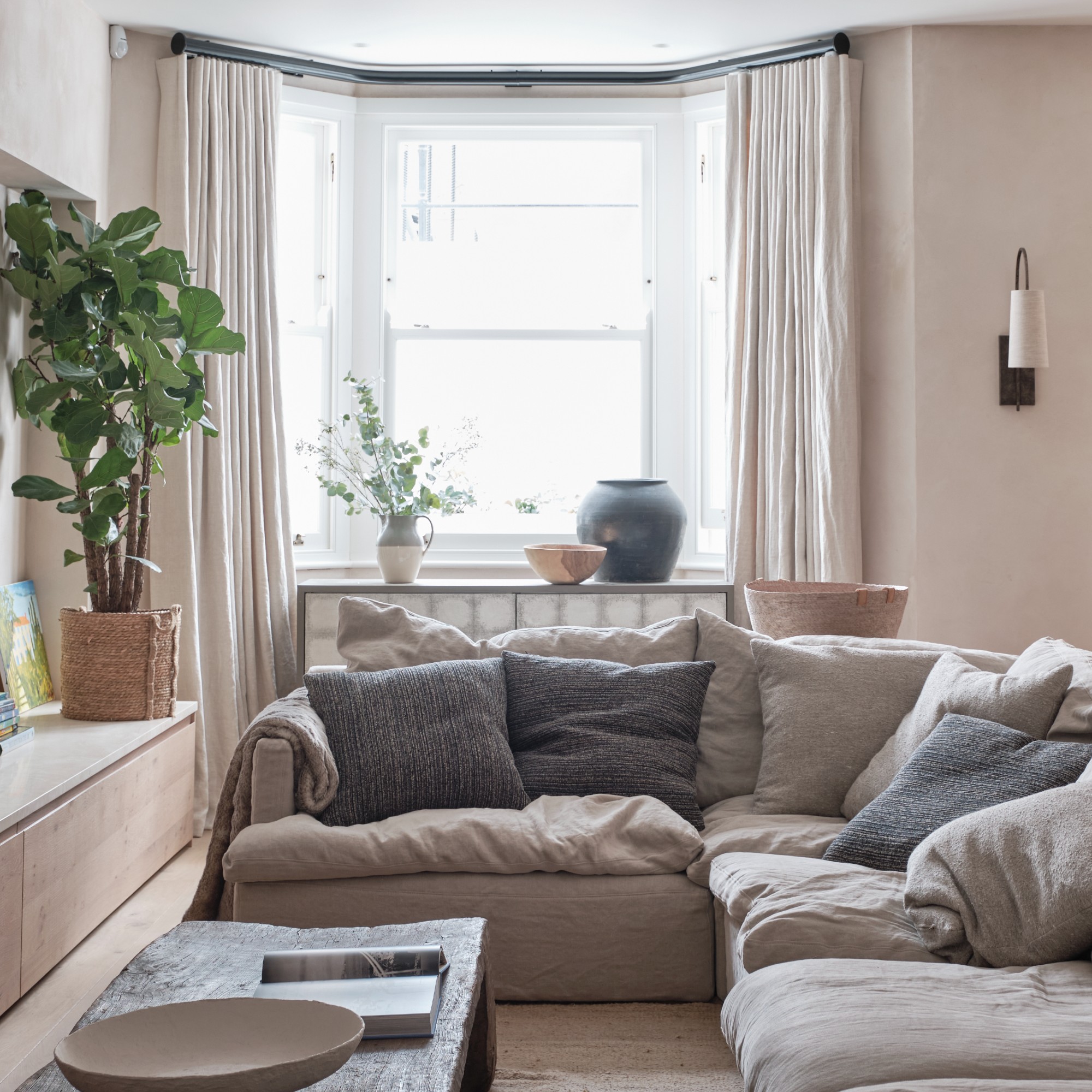
Curtains can be a great tool for elevating a small living space and making it appear larger, but only as long as they are floor length. On the other hand, short curtains tend to cheapen the look of a room and make it seem smaller.
‘Floor-length curtains can make a small living room look more luxurious and spacious because they draw the eye vertically, creating the illusion of height,’ says Debbie Leigh, design manager at ILIV. ‘By extending from the ceiling or near-ceiling to the floor, they emphasize the room’s vertical lines, making the walls appear taller.'
49. Open up the space with blinds
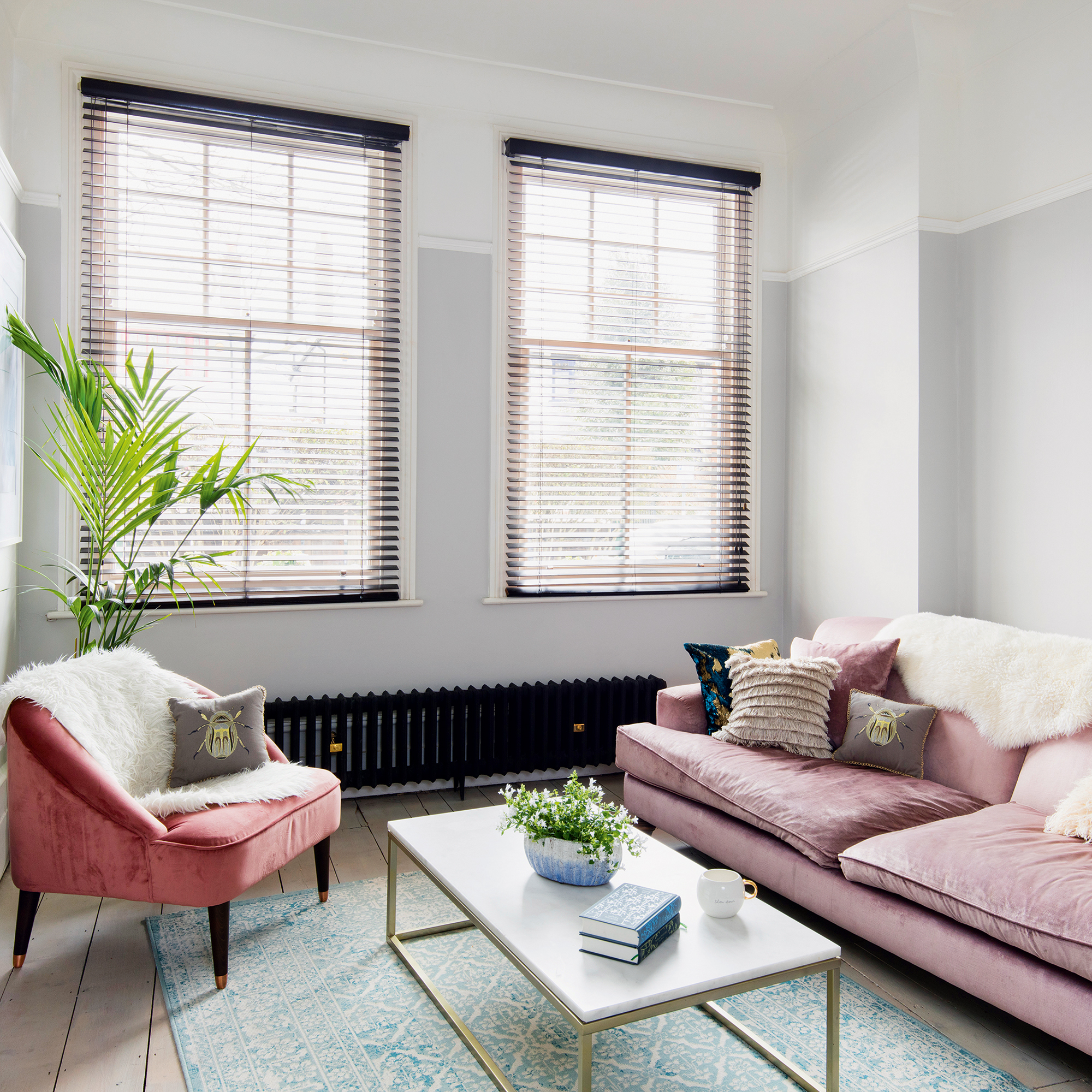
When decorating a tiny living room, it pays to be clever with window dressings and consider forgoing the usual living room curtain ideas. Especially if there isn't enough space around the windows for floor-length curtains. Instead, blinds or shutters could be a smart option to open up the space. And there are so many stylish possibilities – Roman blinds, Venetian blinds, roller blinds and more.
‘Changing accessories in your living room can make a huge difference. Although curtains add an element of luxury to your relaxing space, if your living room is small, it might be worth swapping them out blinds or shutters,’ says Lisa Cooper, head of product at Thomas Sanderson.
50. Hang breezy curtains
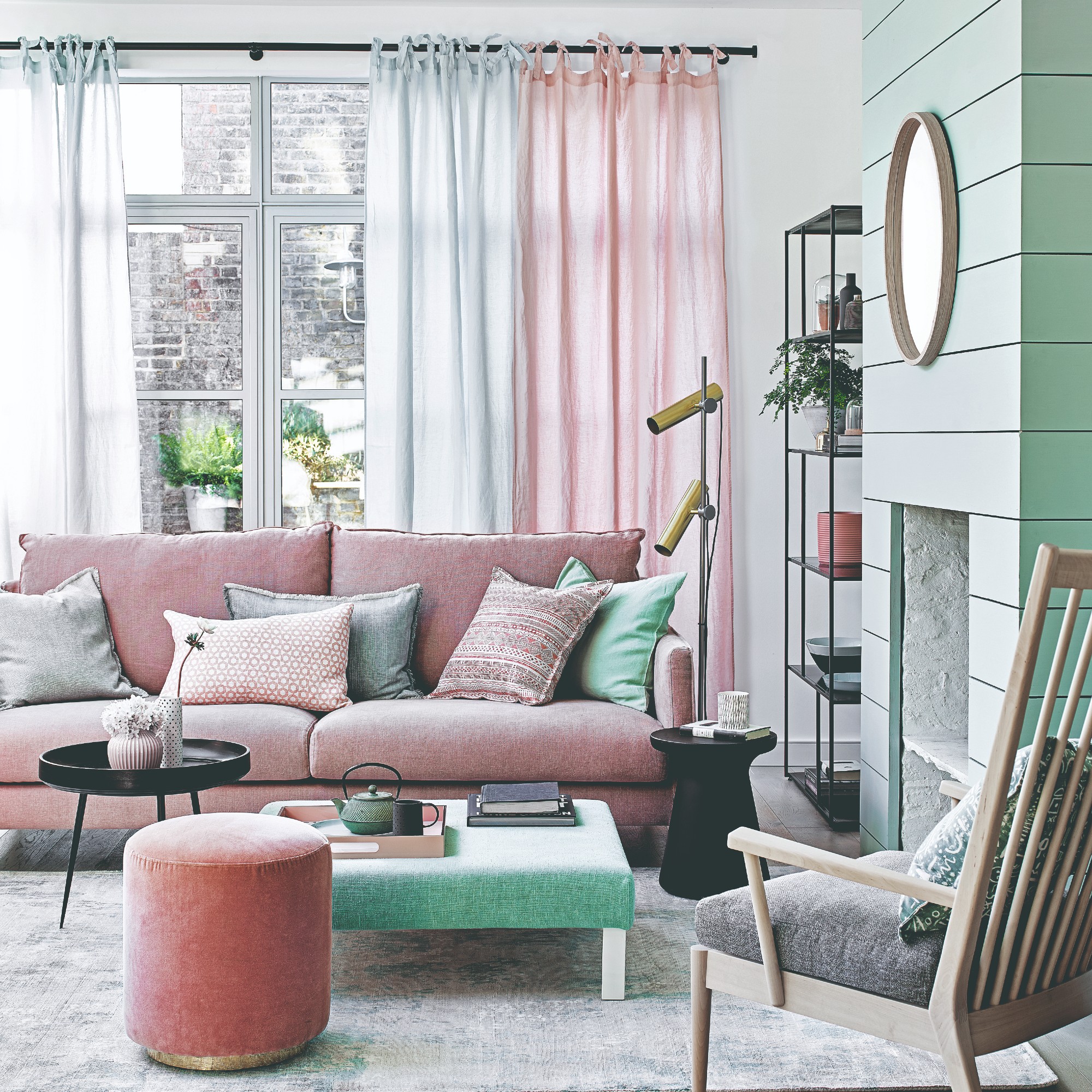
Keeping window treatments sheer and light rather than having anything too heavy will make the area around the window feel more spacious.
Voile curtains like these Habitat ones are best for this, or alternatively you can opt for linen ones like these ones from La Redoute. And as shown in the image above, this can be an opportunity to inject some light wash of colour into the space, rather than opting for traditional white or cream curtains.
FAQs
What is the best way to maximise space in a small living room?
When it comes to the best ways to maximise space in a small lounge, using storage solutions in a clever way is key.
‘Clever storage is key in smaller spaces,’ says Claire Garner of Claire Garner Interiors. ‘Keeping potential clutter hidden and displaying styled objects can instantly elevate your room. Opt for a striped storage ottoman to add visual weight and a subtle pattern. Not only will it look beautiful, but it will also provide storage for items that might otherwise make the room feel cluttered.’
She continues, ‘This is also an opportunity to be innovative with joinery. Creating bespoke cabinetry to fit your items, including your TV, always adds a premium feel to your space. Custom built-ins can provide tailored storage solutions that blend seamlessly with the room's design.’
What type of seating should I use in a small living room?
Just because you're limited by space in your lounge, it doesn't mean you don't have options when it comes to what sofa styles you can incorporate. But, of course, there are definitely some sofa styles to avoid in a small living room.
When choosing a sofa for a small lounge, it's best to opt for something that doesn't visually appear as bulky but rather sleek, slim and airy. Anything with thin or tapered legs works, as do slim arms on a sofa. At the same time, a corner sofa fills underutilised corners in the room, while also creating a cosy look, avoiding a corridor-like effect.
How to decorate a very small living room?
It's all about making clever choices when buying furniture for very small living room ideas. 'Linear furniture designs with a minimal profile are ideal for smaller rooms,' explains Rachael Fell, furniture buying manager at Habitat. 'The open lines of a wire metal coffee table gives the illusion of more space as the surrounding scene is visible through it. Look out for designs that incorporate shelving into their silhouette to maximise storage capabilities.'
And when it comes to colour, be brave and go for that bold shade you love, regardless of the size of the room. 'Some fear that adding a deep or bright colour to a small room will make it appear claustrophobic, opting instead for light neutrals to keep the space open,' says Helen Shaw, UK director at Benjamin Moore.
'However, when working with a small area, dark colours cleverly absorb the light of a space, making the division between walls appear blurred. This ‘blurred edges’ effect adds depth and dimension to a room, making it appear larger.'
Go big with your small living room ideas, space should never be an obstacle to creating your dream home.

Sara Hesikova has been a Content Editor at Ideal Home since June 2024, starting at the title as a News Writer in July 2023. She is now also the Ideal Home Certified Expert in Training on Furniture, and so far has tested over 150 different sofas.
Graduating from London College of Fashion with a bachelor’s degree in fashion journalism in 2016, she got her start in niche fashion and lifestyle magazines like Glass and Alvar as a writer and editor before making the leap into interiors, working with the likes of 91 Magazine and copywriting for luxury bed linen brand Yves Delorme among others.
- Kayleigh DrayActing Content Editor
- Rebecca KnightDeputy Editor, Digital
- Tamara KellyContributor